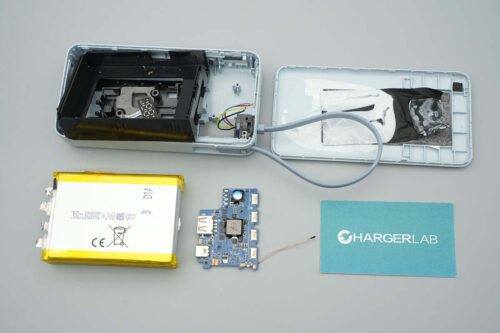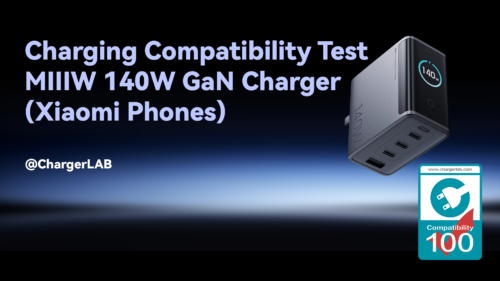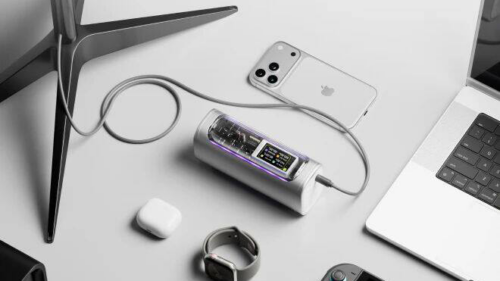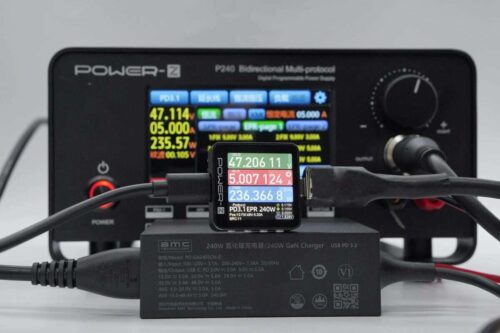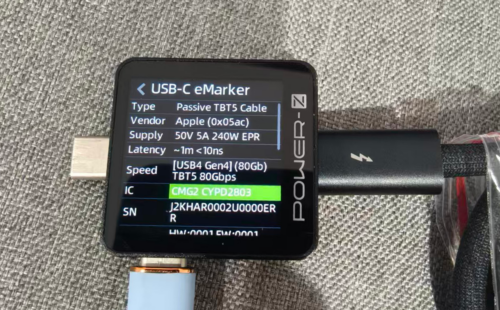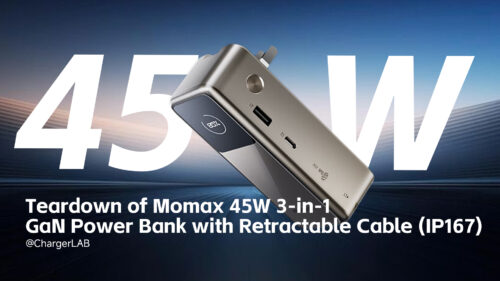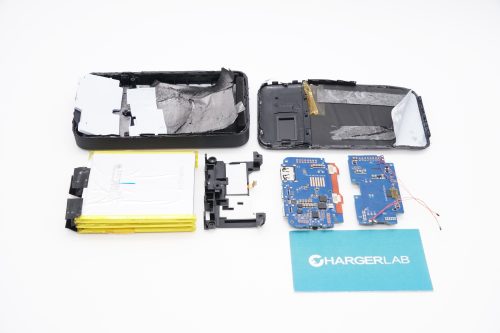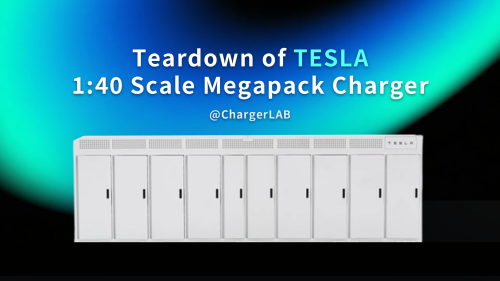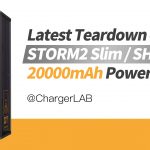Introduction
Xiaomi has recently launched a new 67W power bank series with an integrated cable and digital display, available in 10,000mAh and 20,000mAh capacities. Both models feature a built-in USB-C cable along with one USB-A and one USB-C port, supporting 65W input and 67W output bidirectional PD fast charging. They are also compatible with Xiaomi’s 67W Surge fast-charging protocol, delivering rapid power restoration for Xiaomi smartphones and efficient charging for thin-and-light laptops.
The 20,000mAh version offers strong endurance, making it ideal for business travel and outdoor use. The built-in USB-C cable can also serve as a carrying strap, while the LED digital display allows users to check the remaining battery level at a glance, providing convenient power management and solid practicality. Next, let’s take a closer look at its internal components and design.
Product Appearance
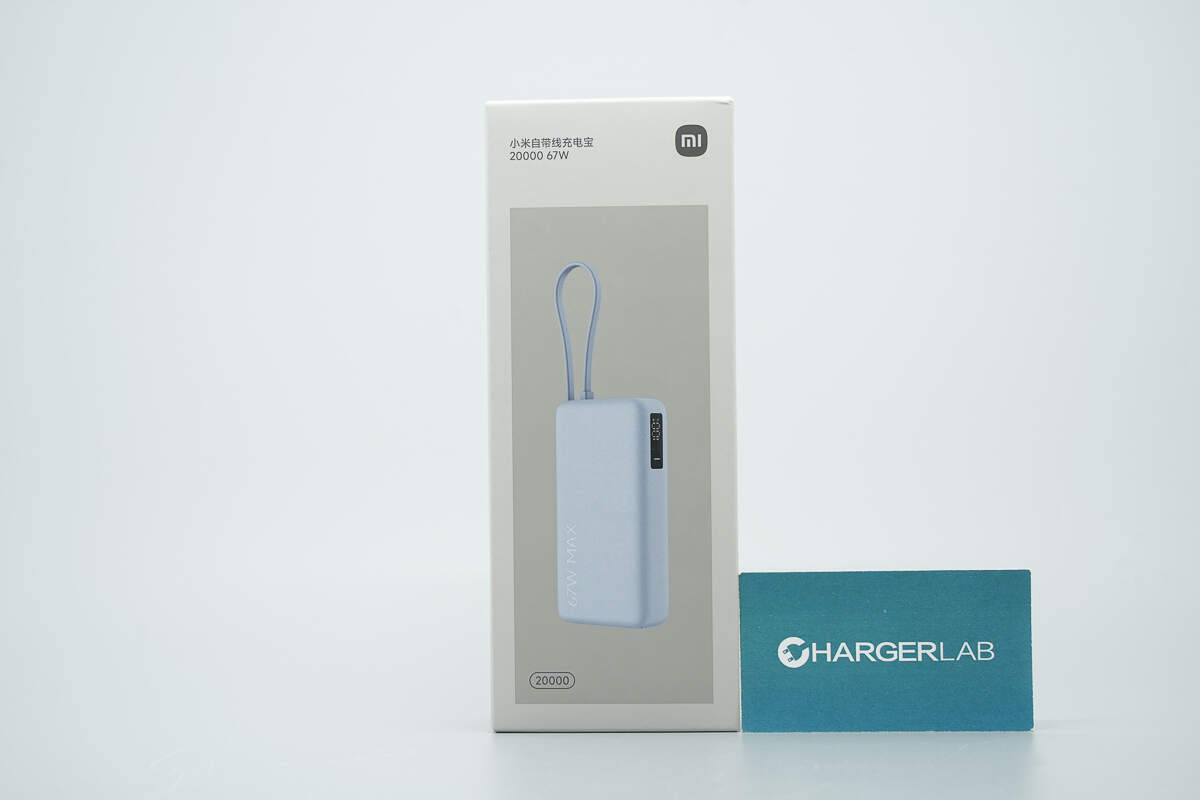
The front of the packaging features the Xiaomi logo, the product name, and an image of the power bank.
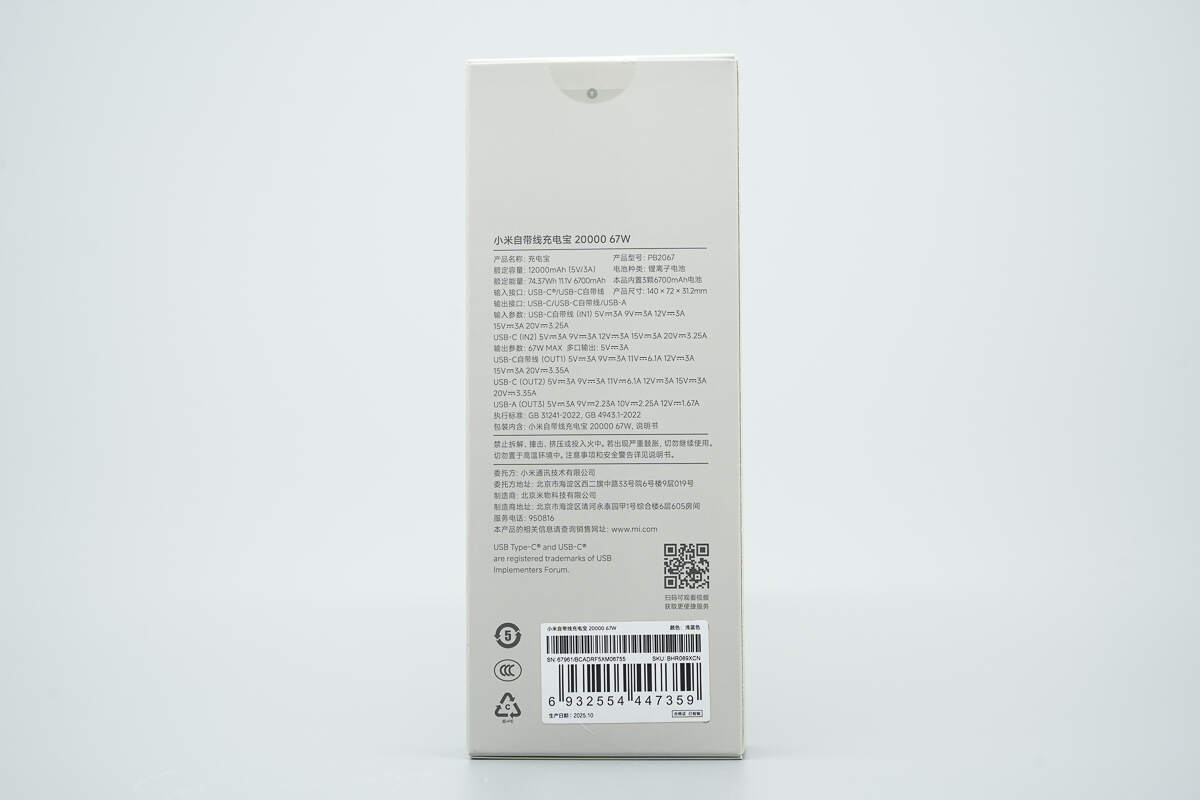
The back of the packaging displays the specifications information.
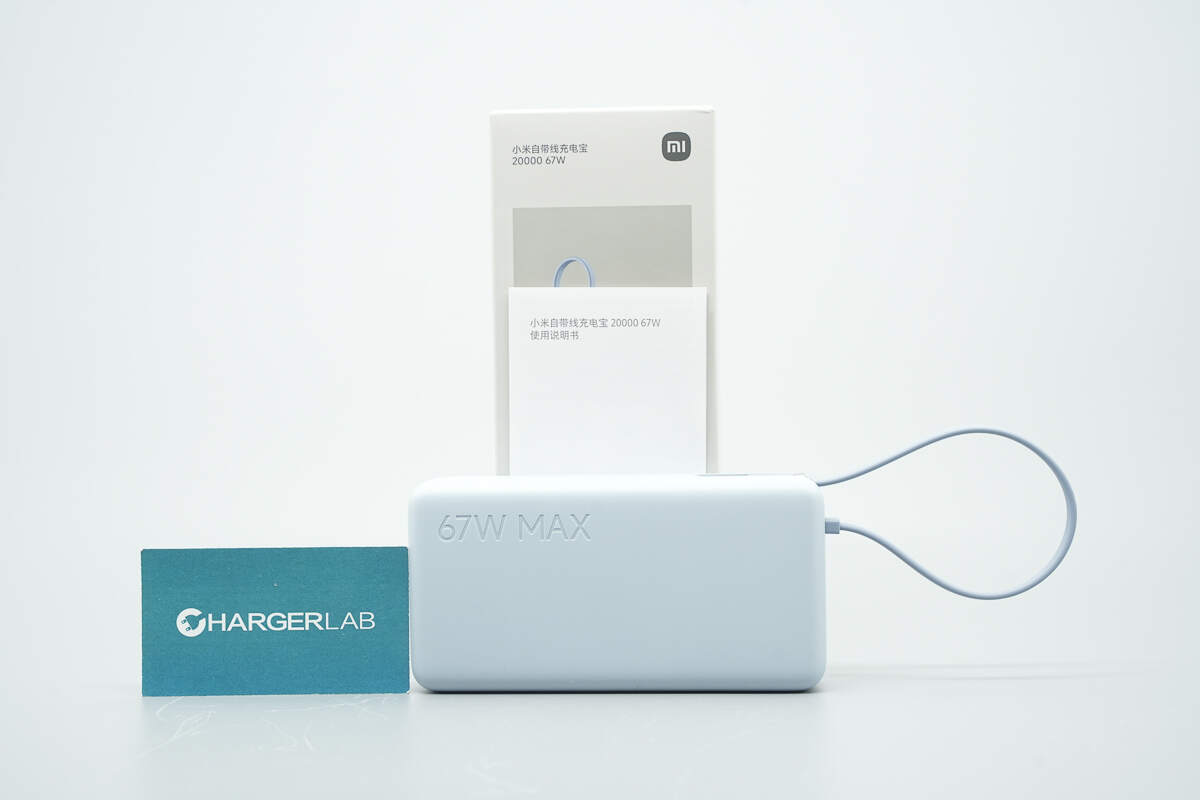
The package includes the power bank and a user manual.
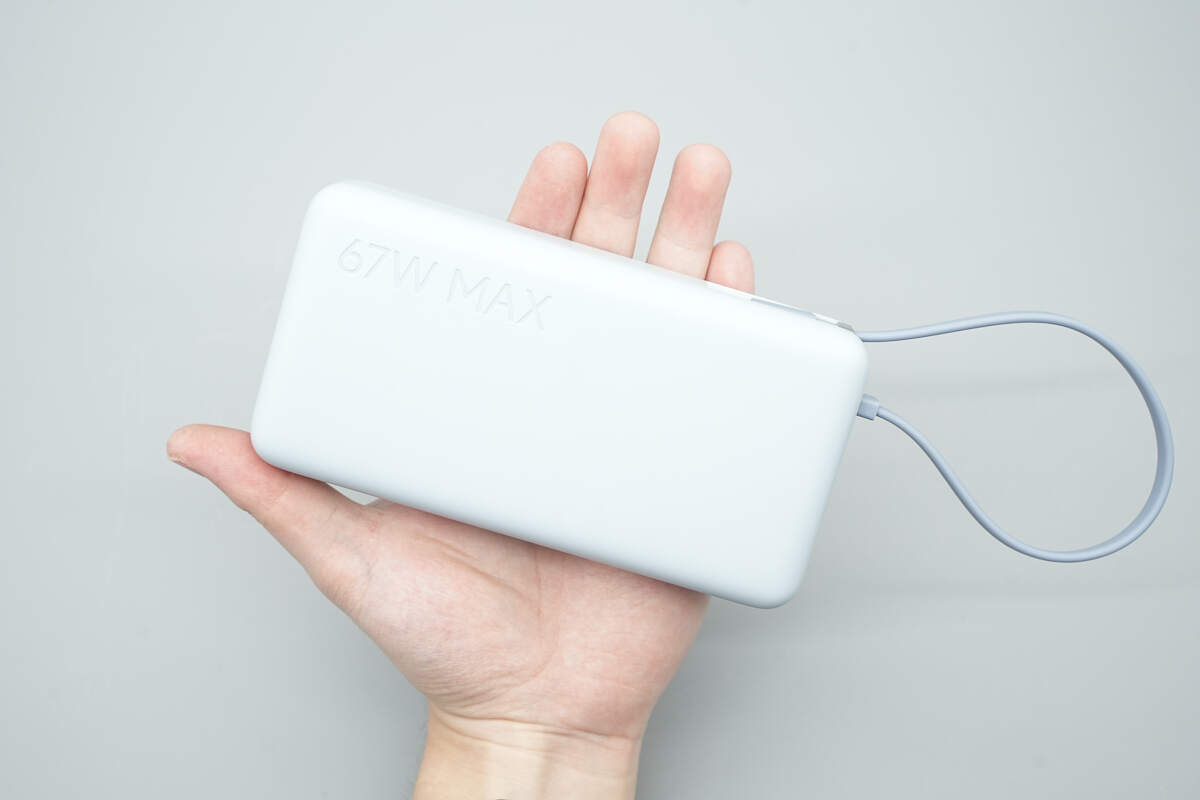
The casing is made of flame-retardant PC material with a matte surface finish.
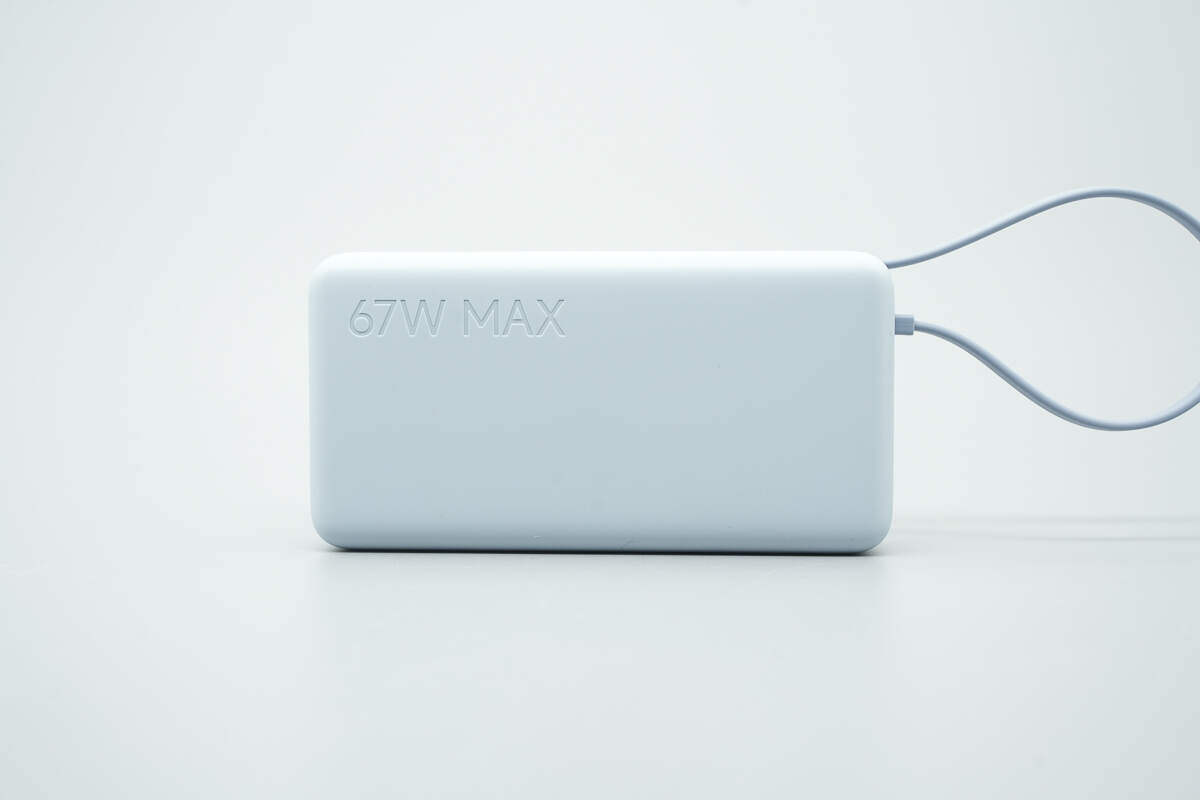
The front is engraved with “67W MAX.”
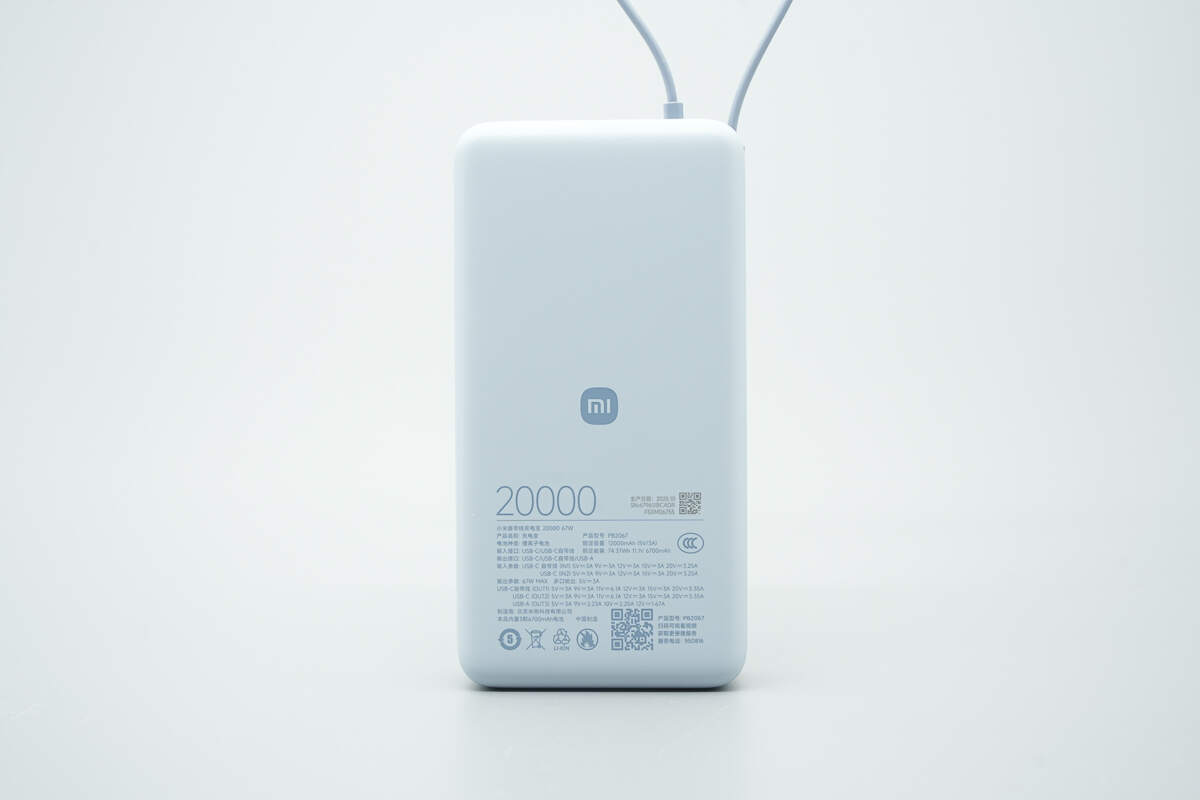
The back is printed with the specifications.
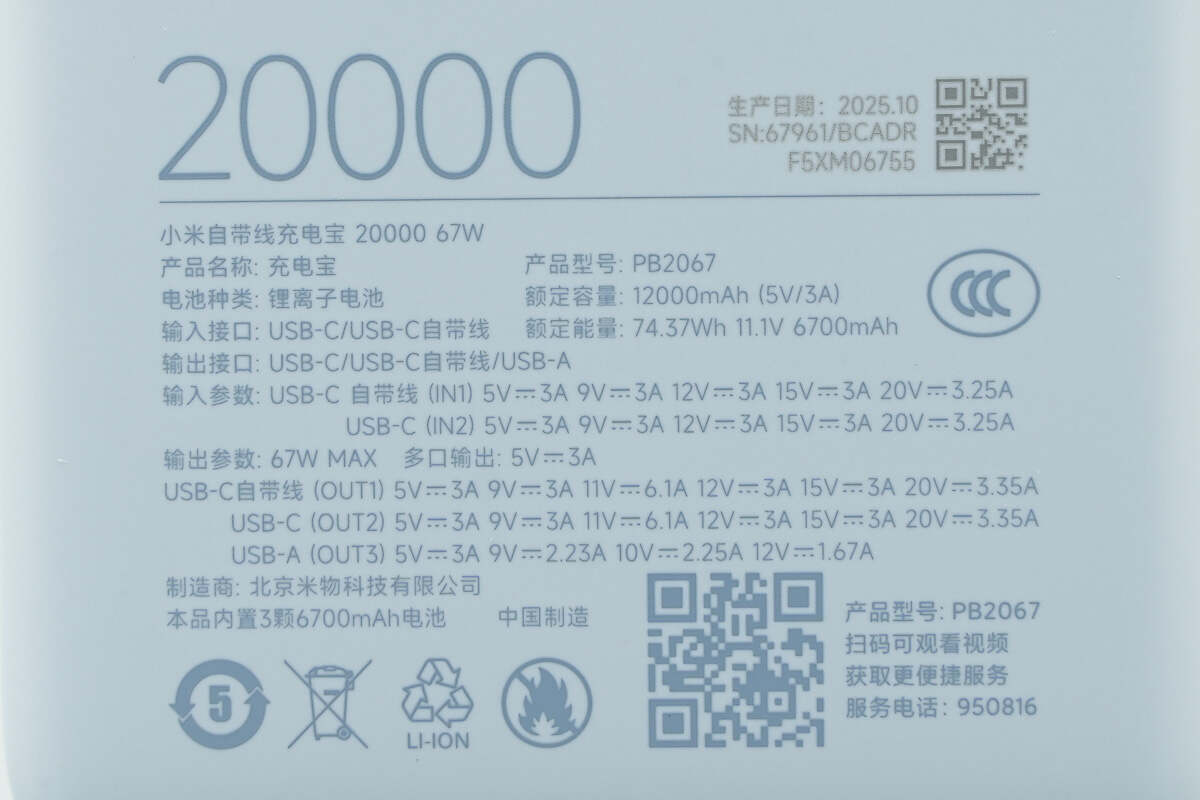
Model: PB2067
Battery type: Lithium-ion battery
Input ports: USB-C / Built-in USB-C cable
Output ports: USB-C / Built-in USB-C cable / USB-A
Rated capacity: 12,000mAh (5V 3A)
Rated energy: 74.37Wh 11.1V 6700mAh
Input specifications:
USB-C / Built-in USB-C cable: 5V 3A, 9V 3A, 12V 3A, 15V 3A, 20V 3.25A
Output specifications:
Maximum output power: 67W MAX
Multi-port output: 5V 3A
USB-C / Built-in USB-C cable: 5V 3A, 9V 3A, 11V 6.1A, 12V 3A, 15V 3A, 20V 3.35A
USB-A: 5V 3A, 9V 2.23A, 10V 2.25A, 12V 1.67A
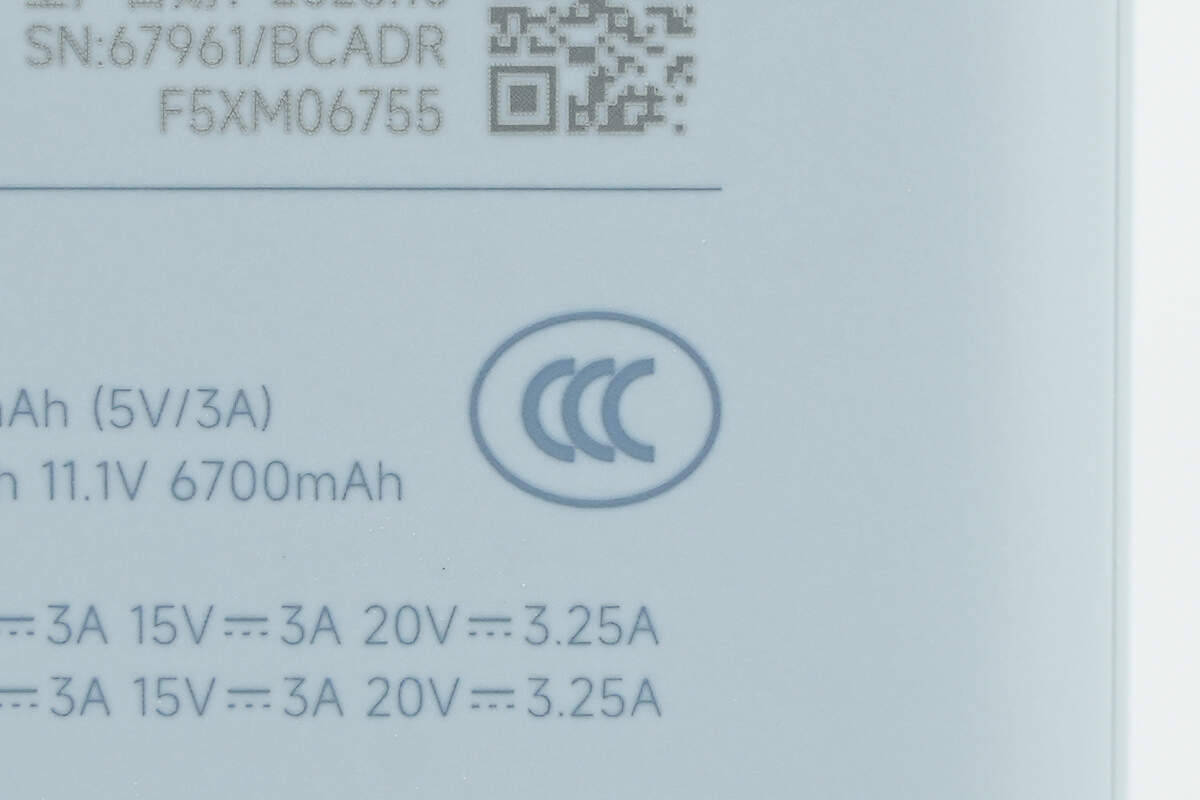
It has obtained CCC certification.
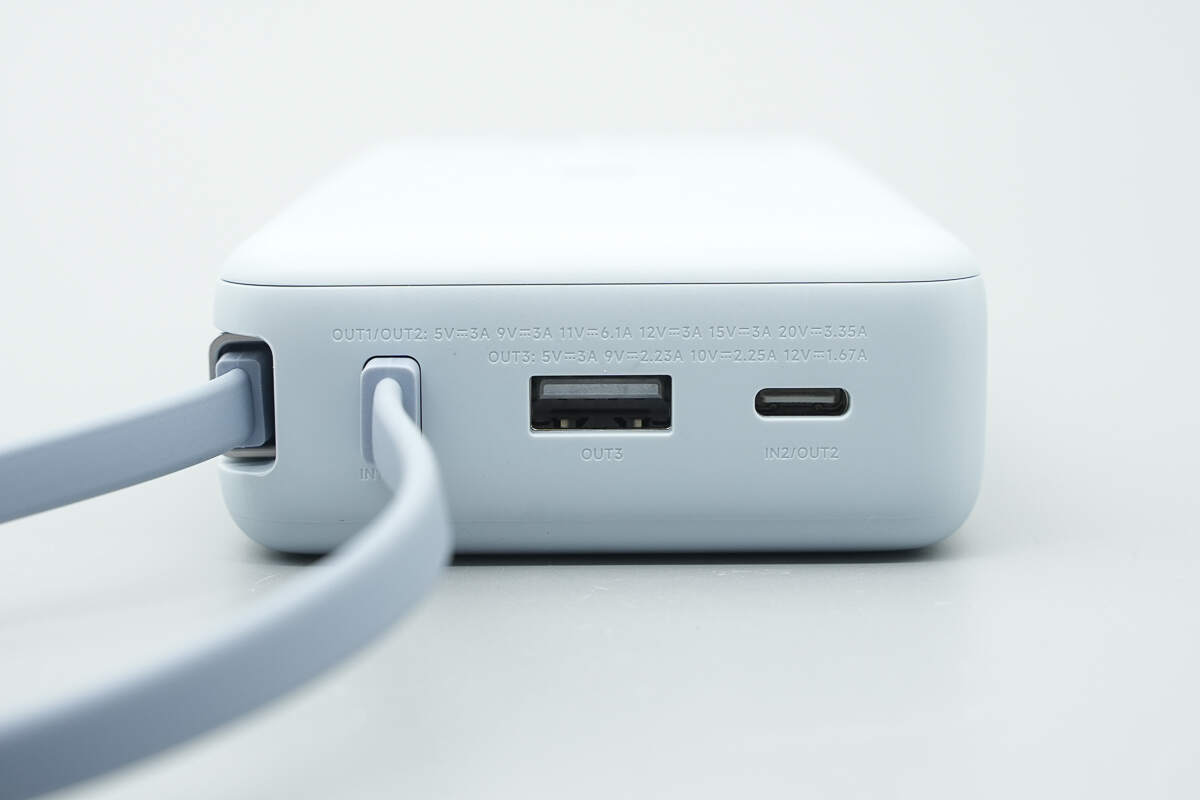
The top features one USB-A port, one USB-C port, and a built-in USB-C cable.
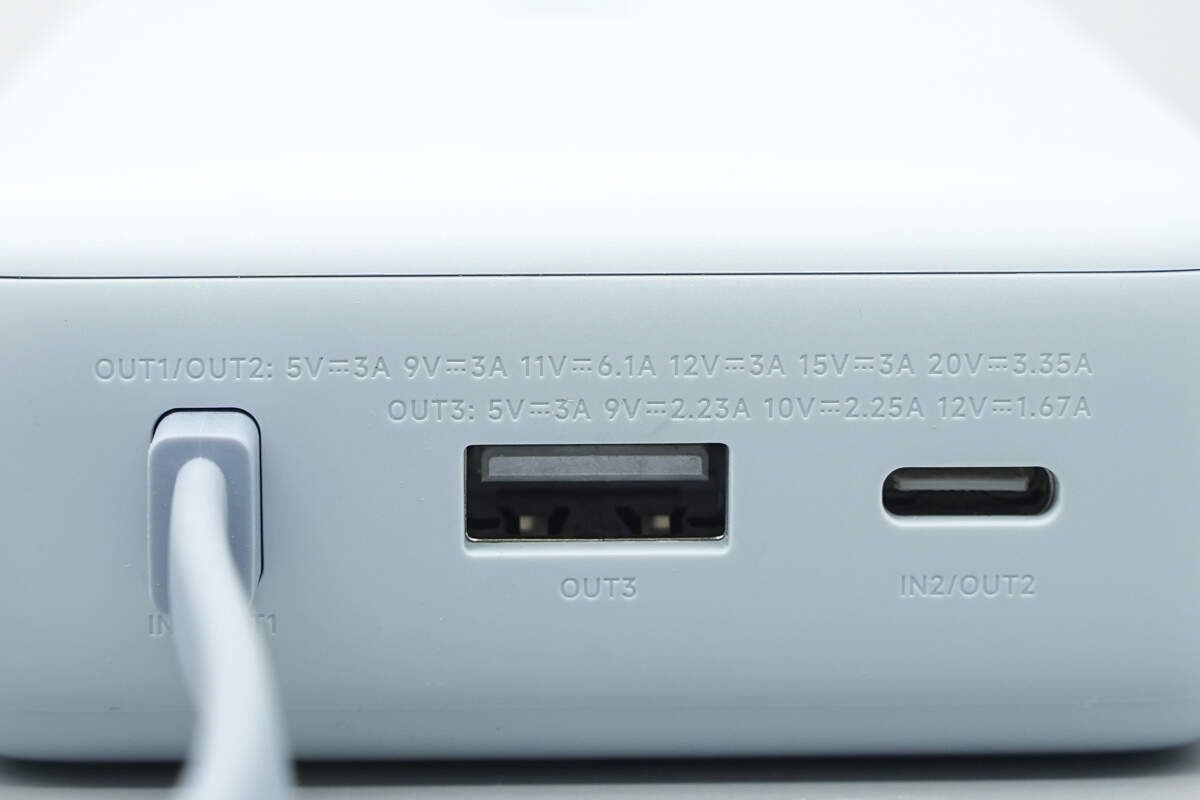
The output specifications are indicated next to the ports.
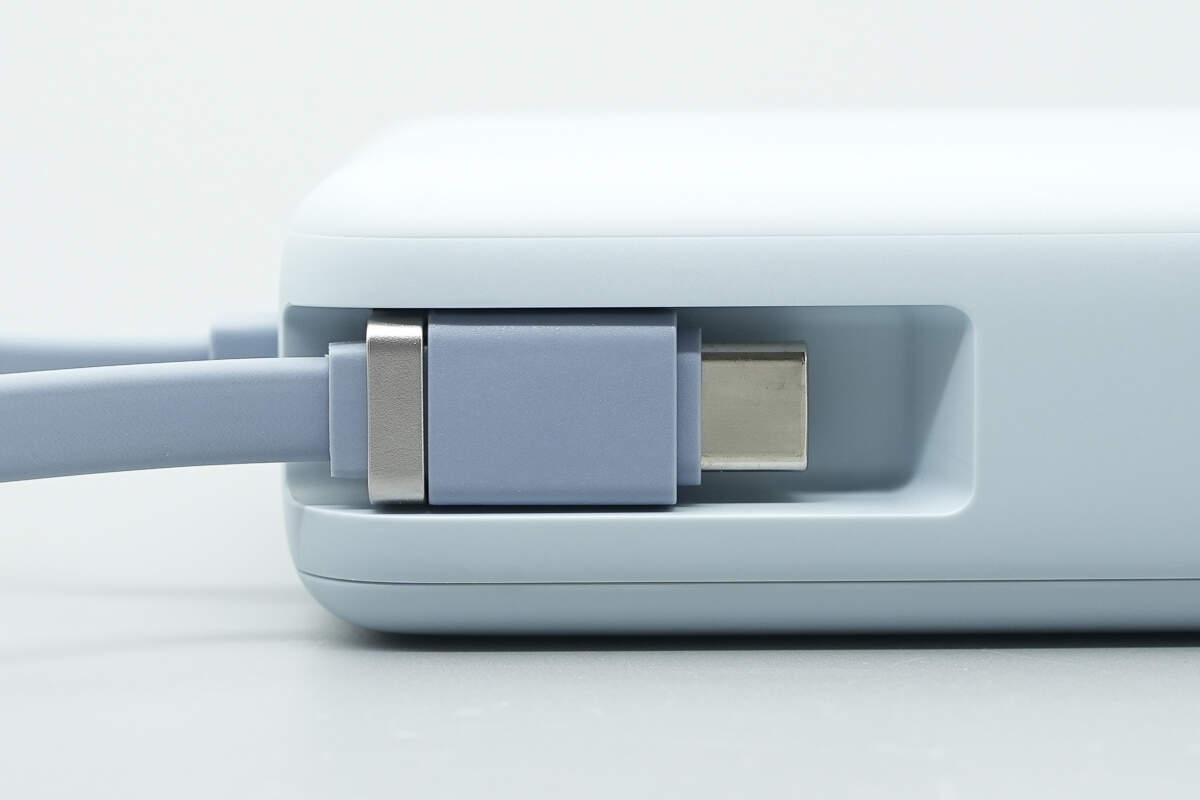
The side features a metal latch and a cable groove.
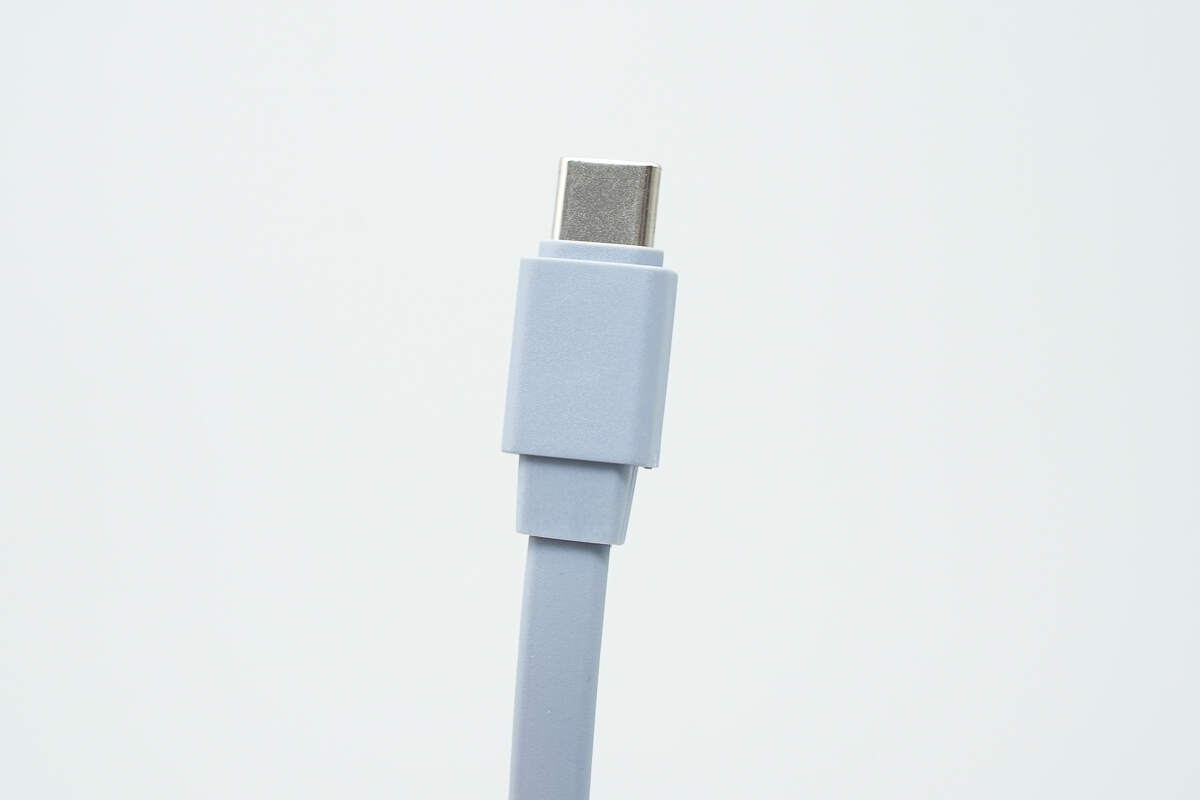
The built-in cable has a flat body, and the connector housing features a matte finish.
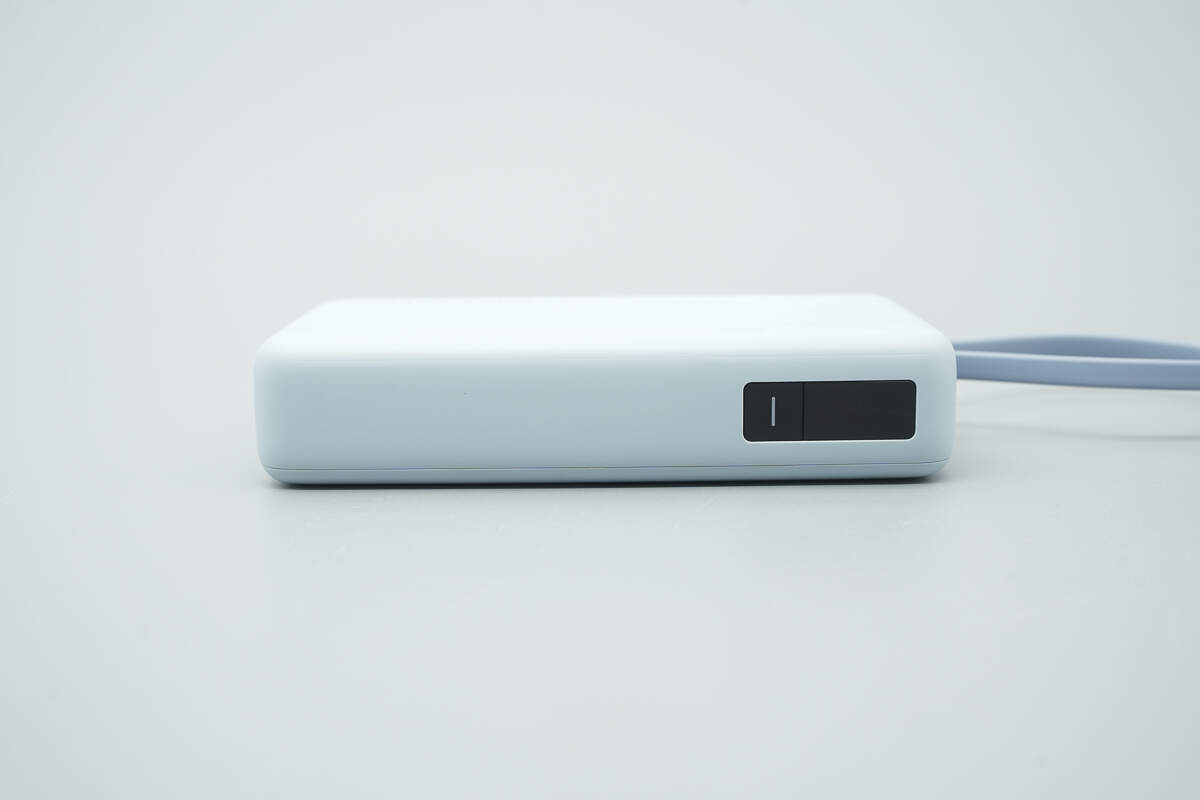
The other side houses the power button and the digital display.
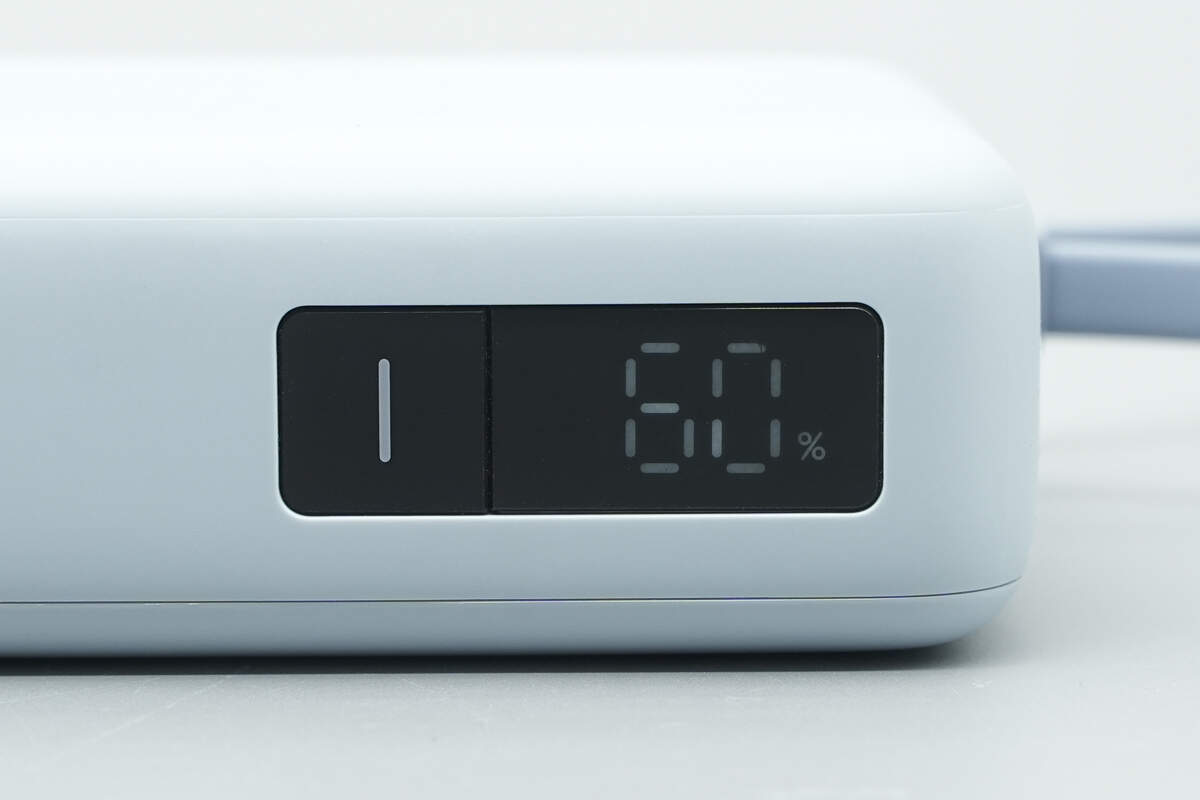
The digital display shows the remaining battery level.
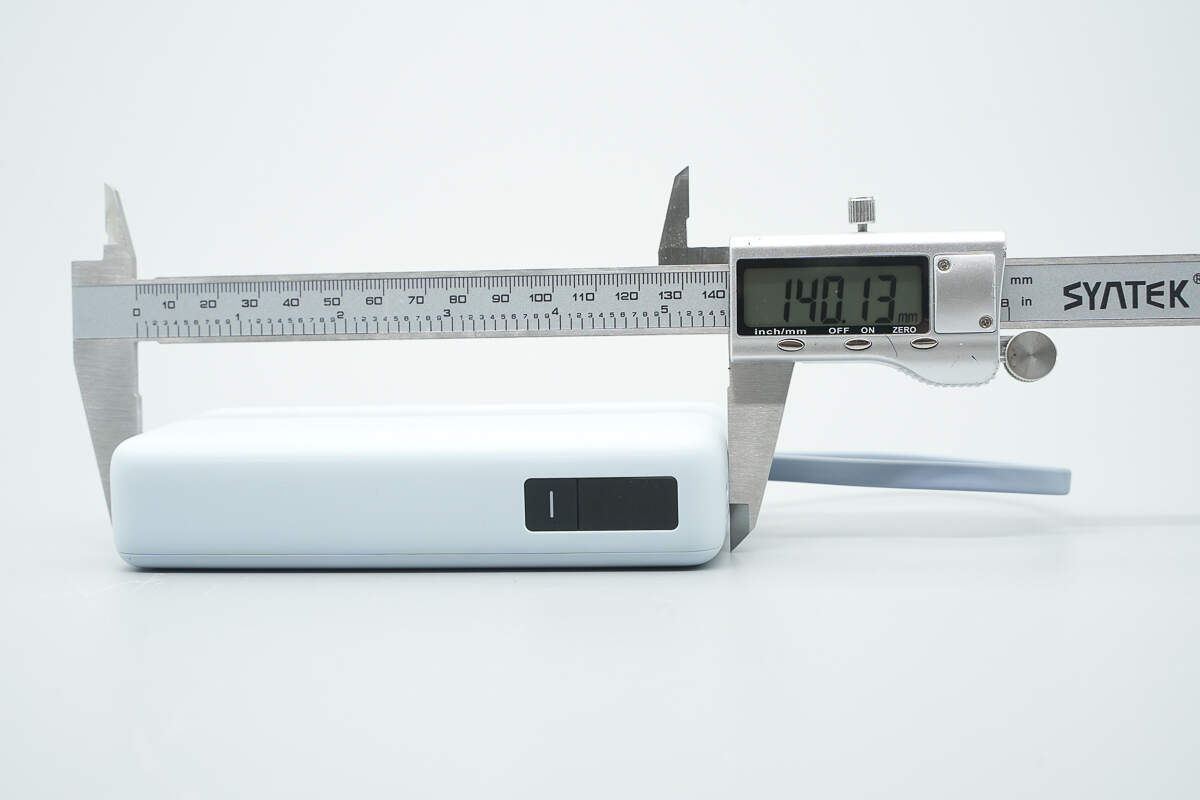
The length of the power bank is about 140.13 mm (5.52 inches).
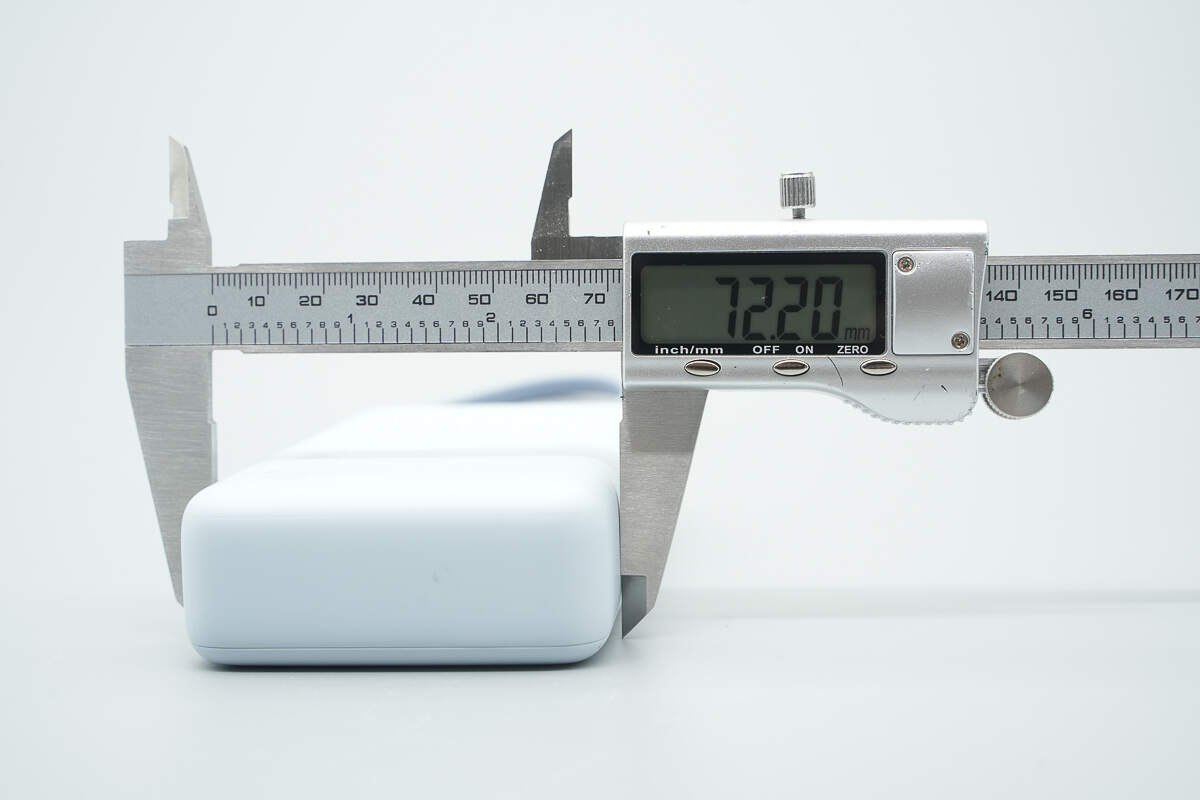
The width is about 72.2 mm (2.84 inches).

The thickness is about 31.03 mm (1.22 inches).
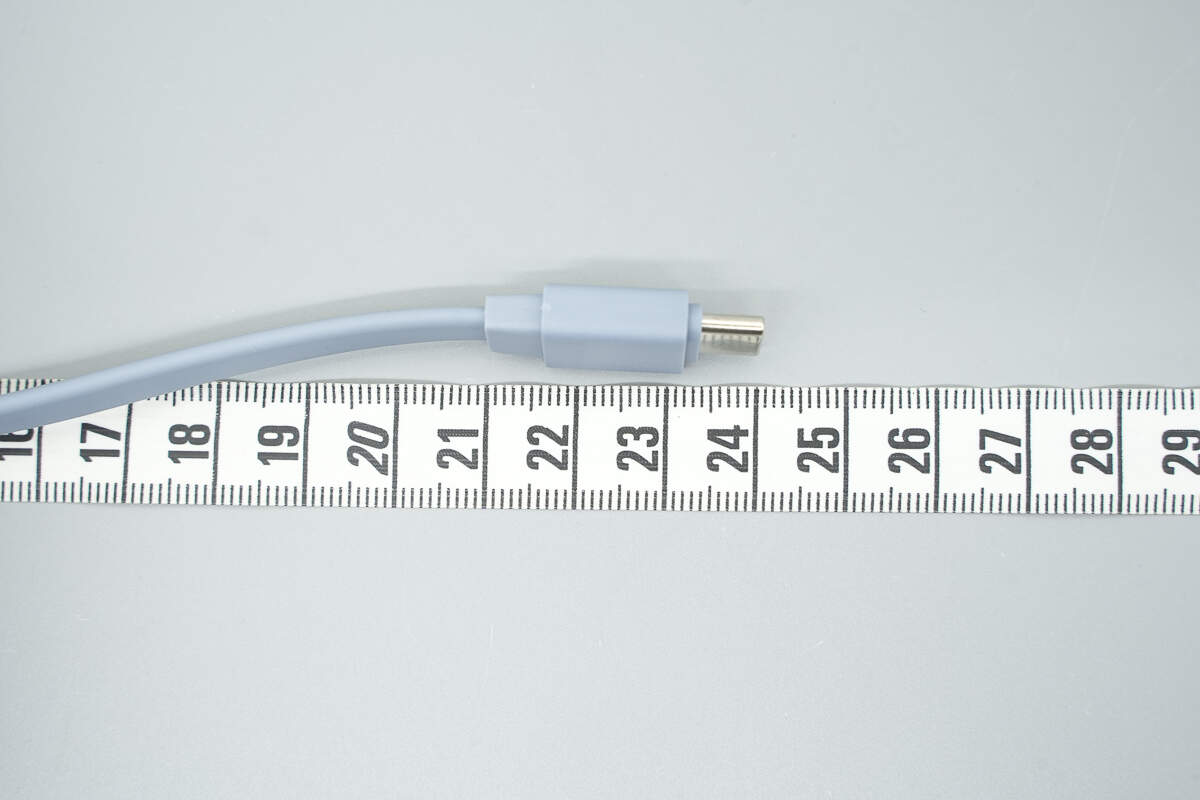
The length of the cable is about 24 cm (9.45 inches).

That's how big it is in the hand.
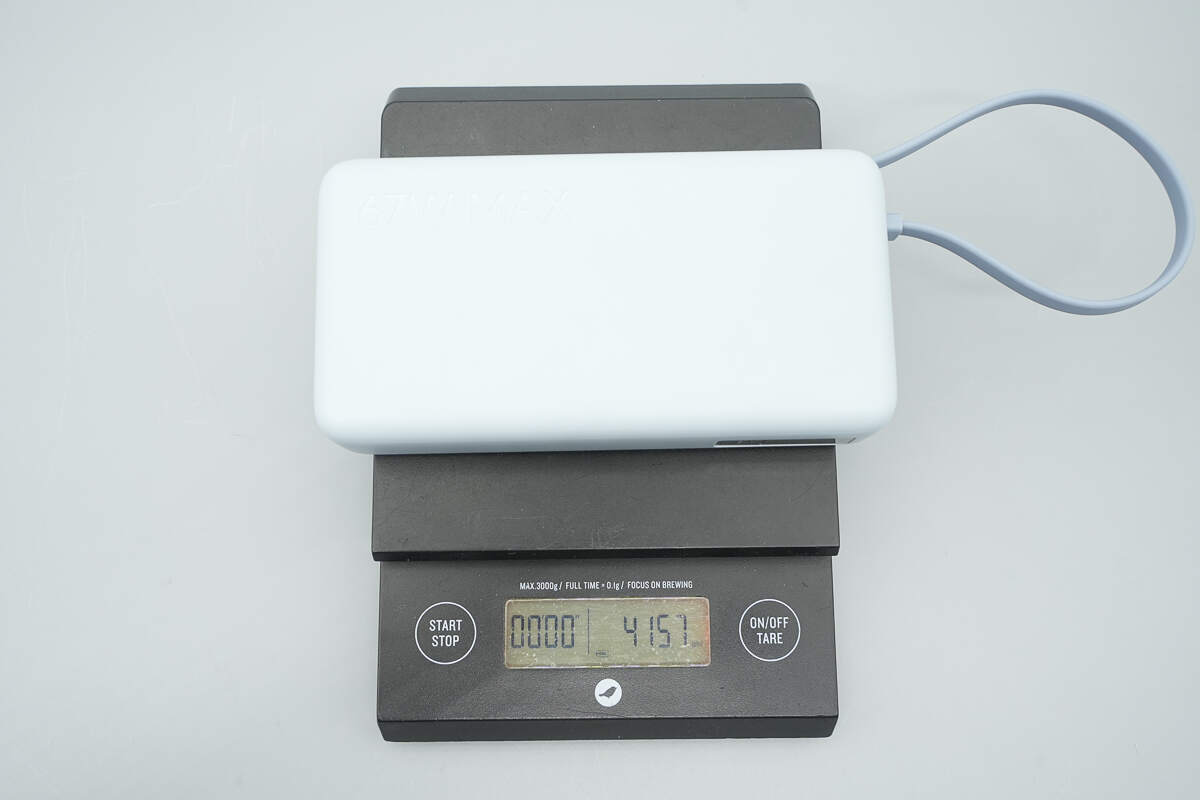
The weight is about 416 g (14.67 oz).
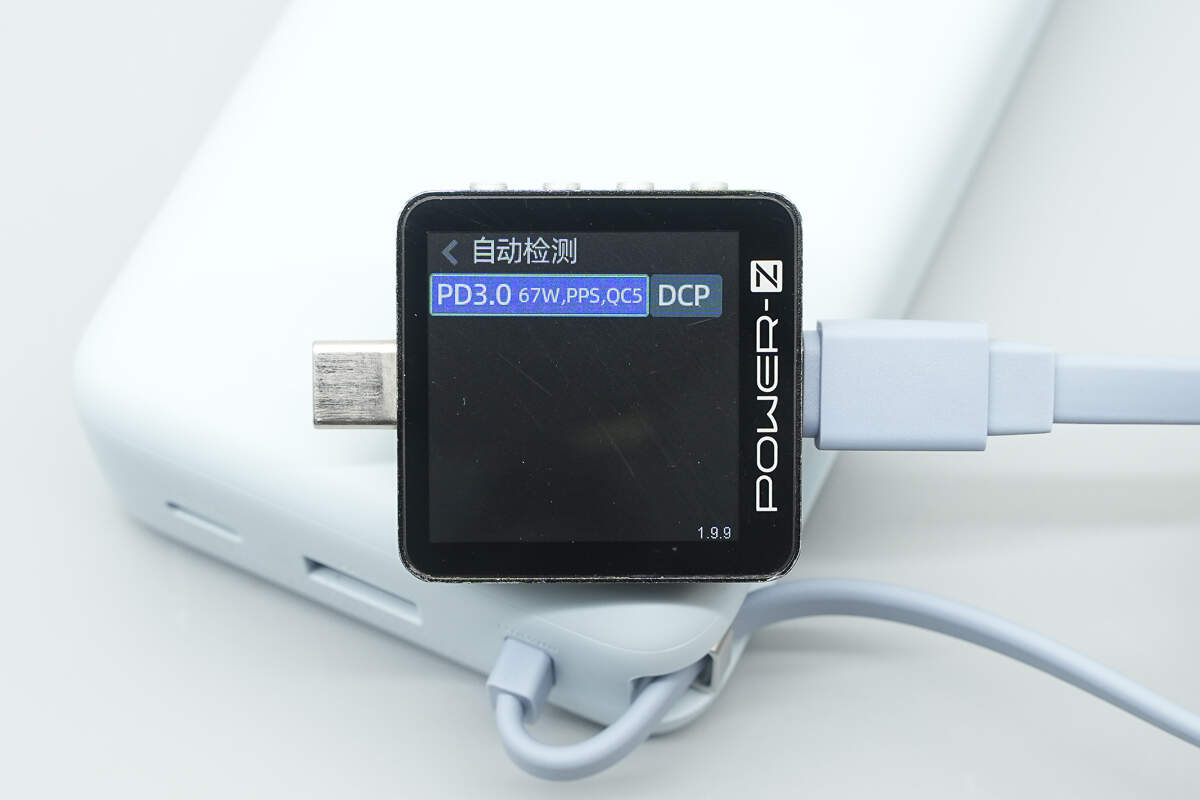
ChargerLAB POWER-Z KM003C shows that the USB-C cable supports PD3.0, PPS, QC5, and DCP charging protocols.
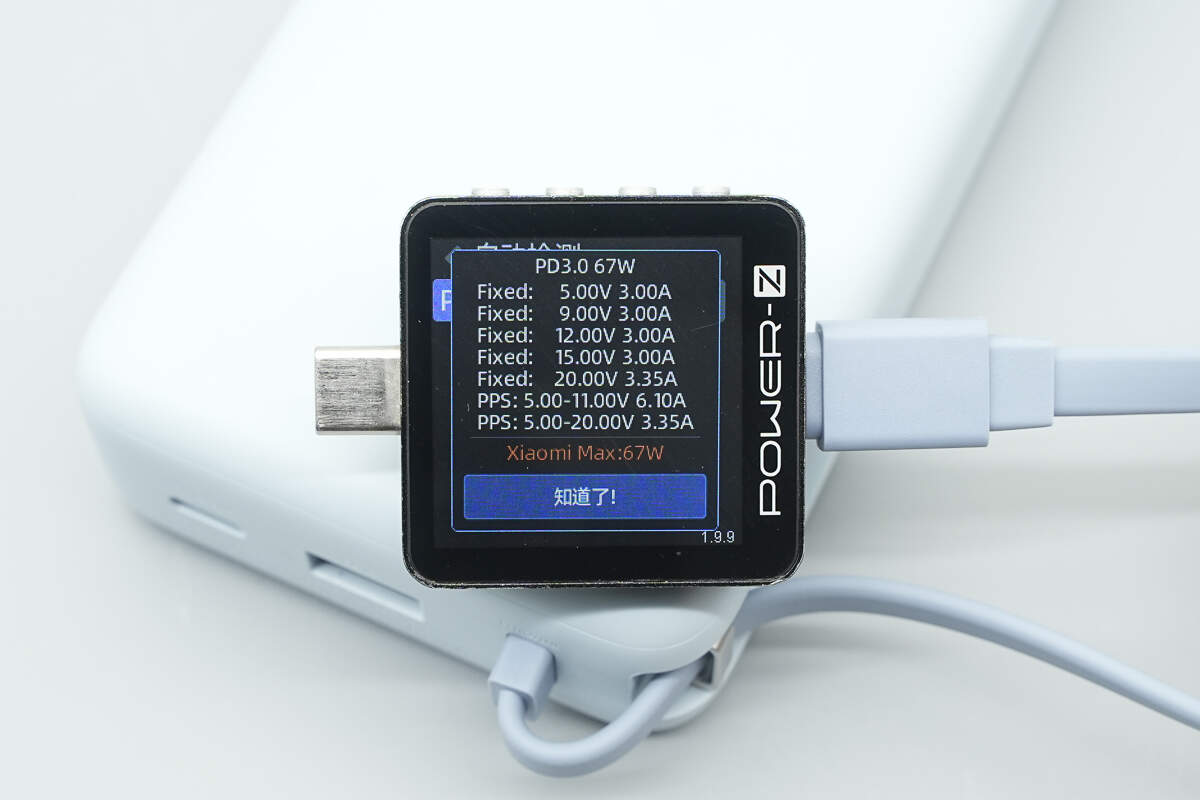
It has five fixed PDOs of 5V3A, 9V3A, 12V3A, 15V3A, and 20V3.35A, along with two sets of PPS voltage levels: 5–11V 6.1A and 5–20V 3.35A. It also supports Xiaomi’s 67W Surge fast charging.
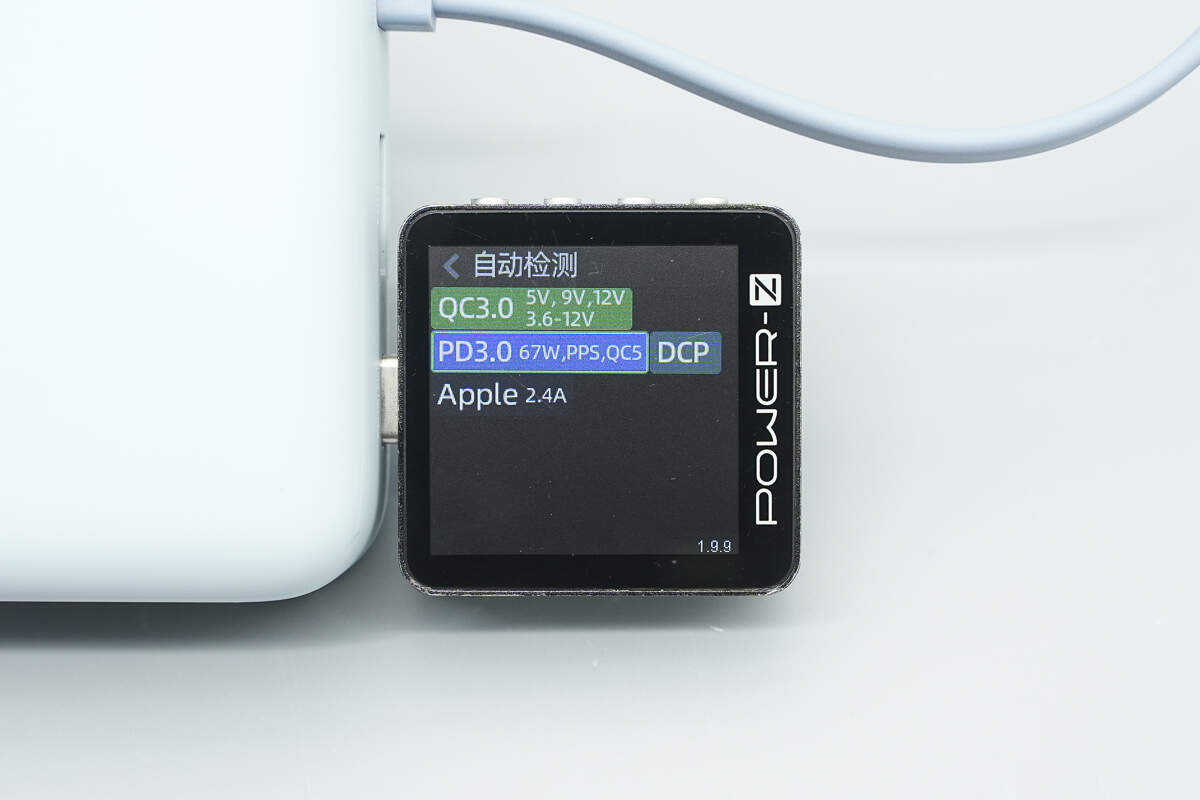
The USB-C port supports QC3.0, PD3.0, PPS, QC5, DCP, and Apple 2.4A protocols.
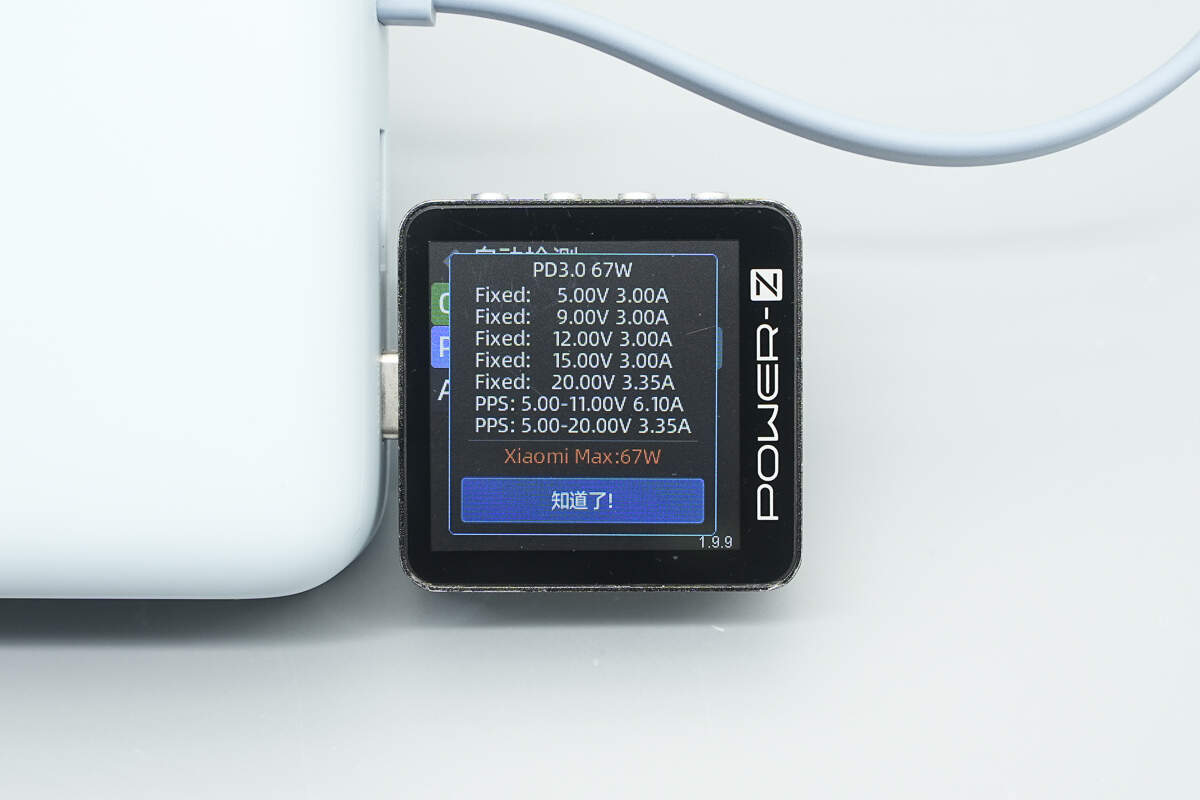
It has five fixed PDOs of 5V3A, 9V3A, 12V3A, 15V3A, and 20V3.35A, along with two sets of PPS voltage levels: 5-11V6.1A and 5-20V3.35. It also supports Xiaomi’s 67W Surge fast charging.
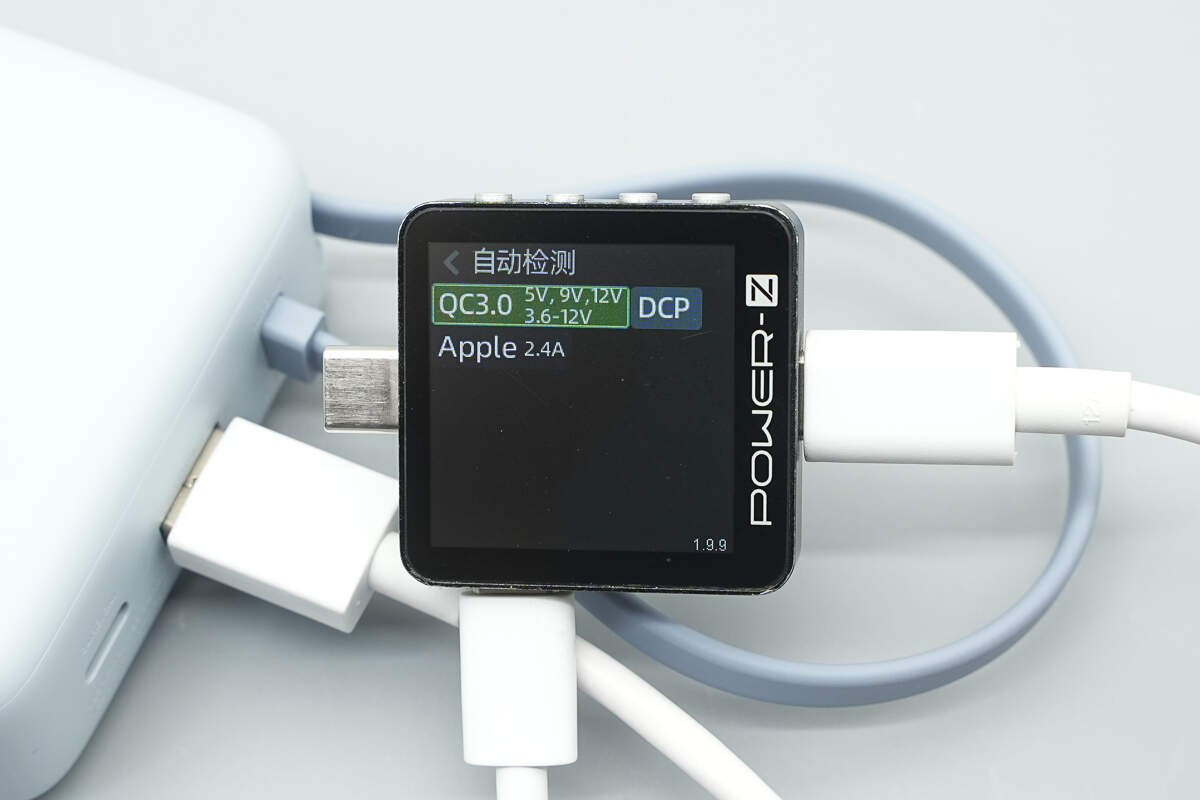
The USB-A port supports QC3.0, DCP, and Apple 2.4A protocols.
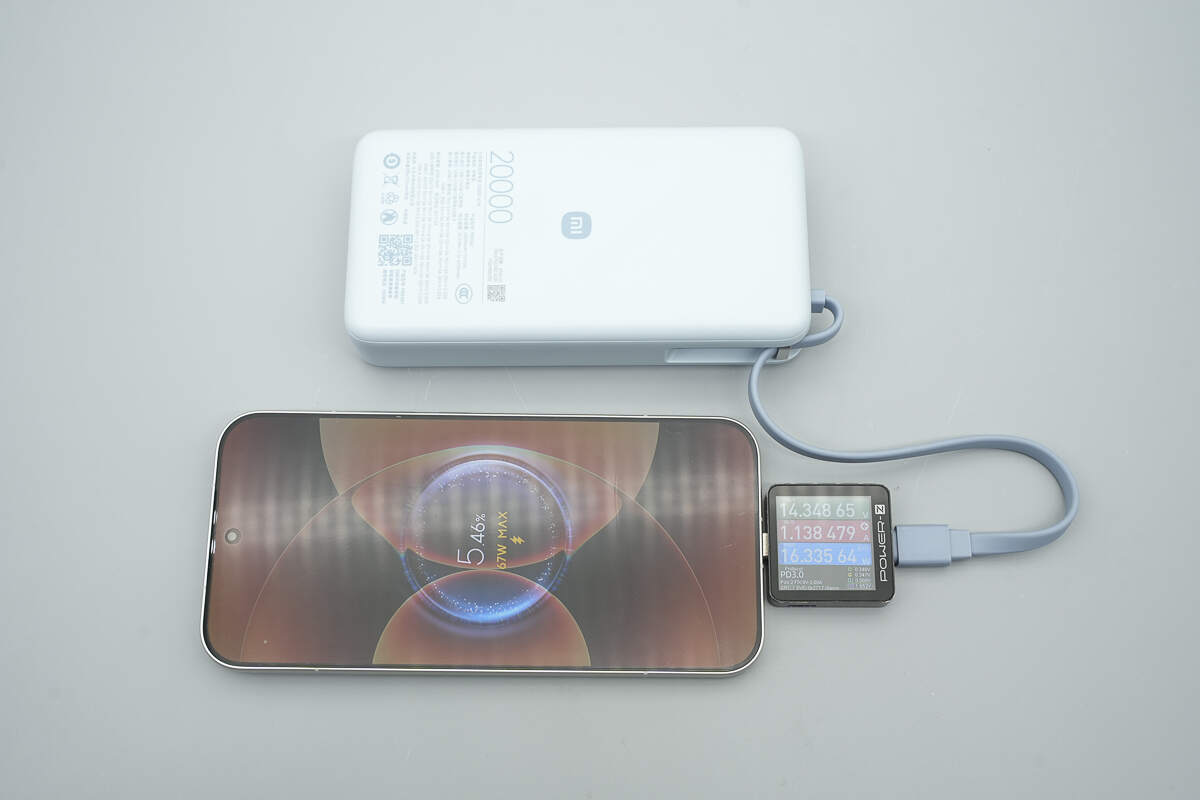
Using the built-in USB-C cable to charge the Xiaomi 17 Pro Max, it successfully activated Xiaomi’s 67W Surge fast charging.
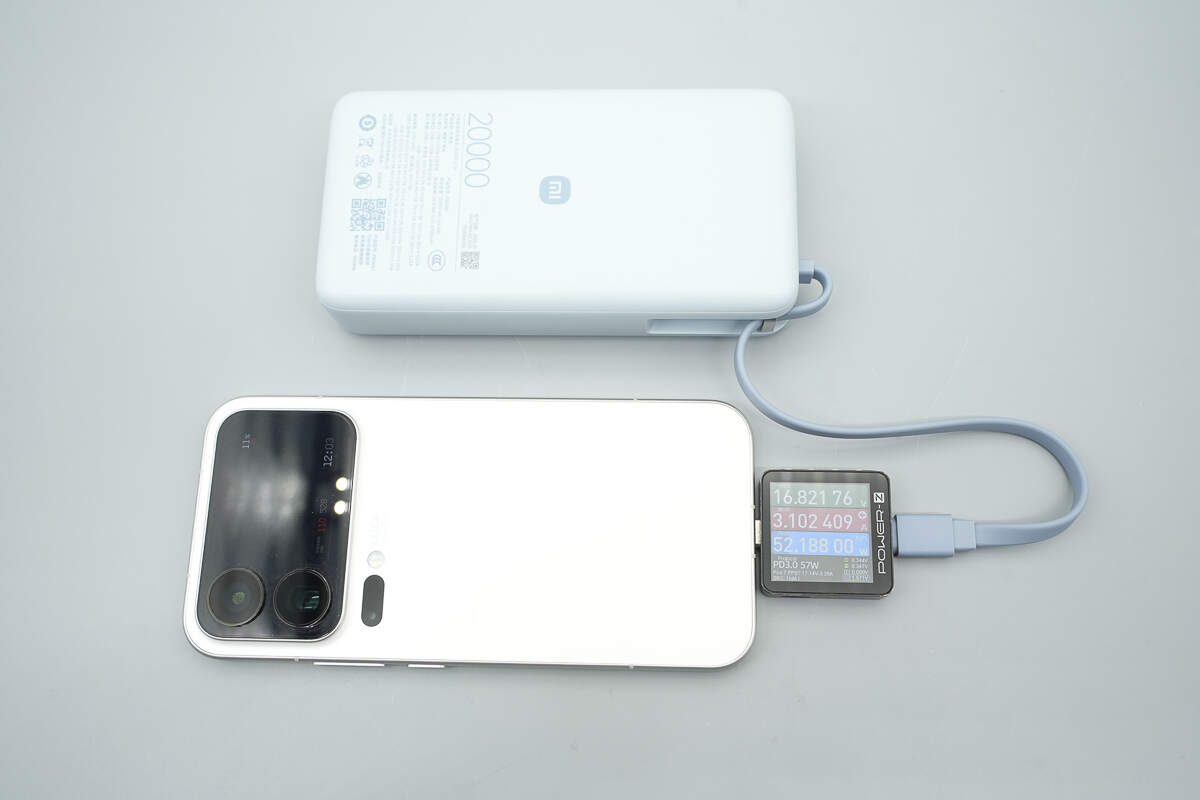
When the charging power reached a stable state, it measured 52.19W.
Teardown
Next, let's take it apart to see its internal components and structure.
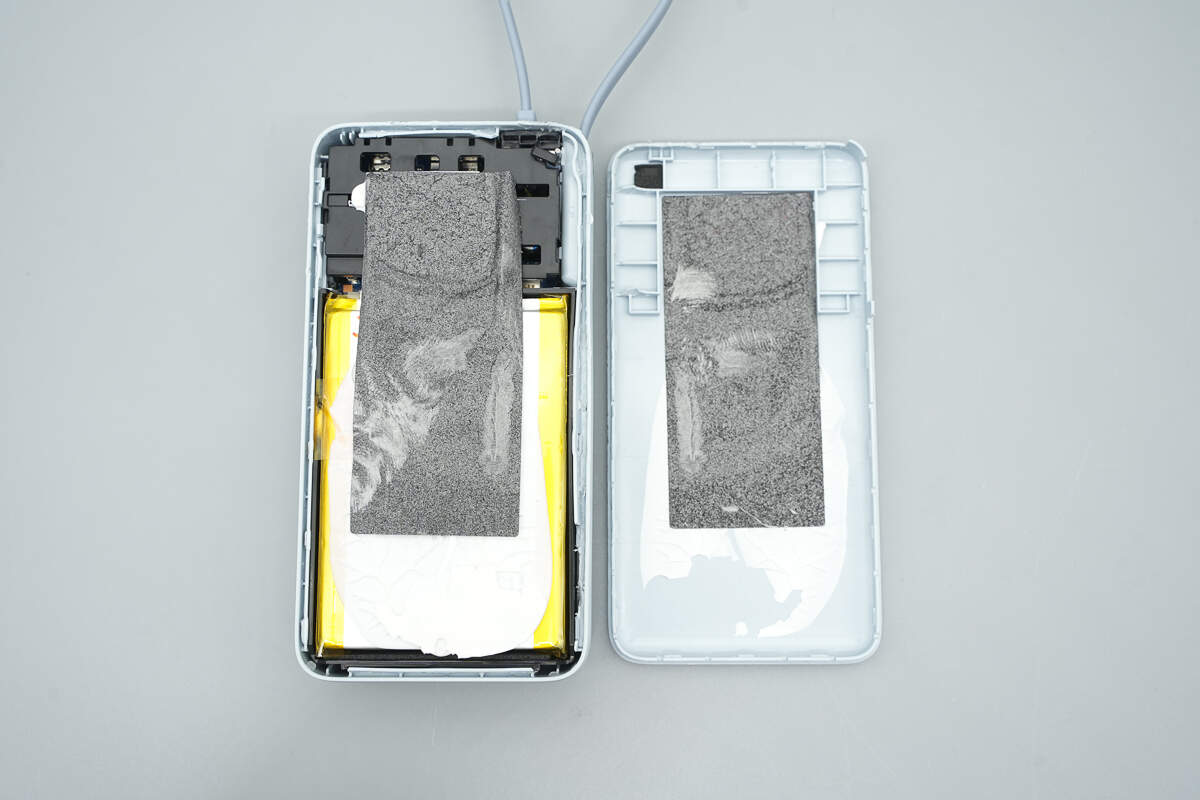
Upon opening the casing, the inner side is lined with graphite sheets and adhesive to aid battery heat dissipation.
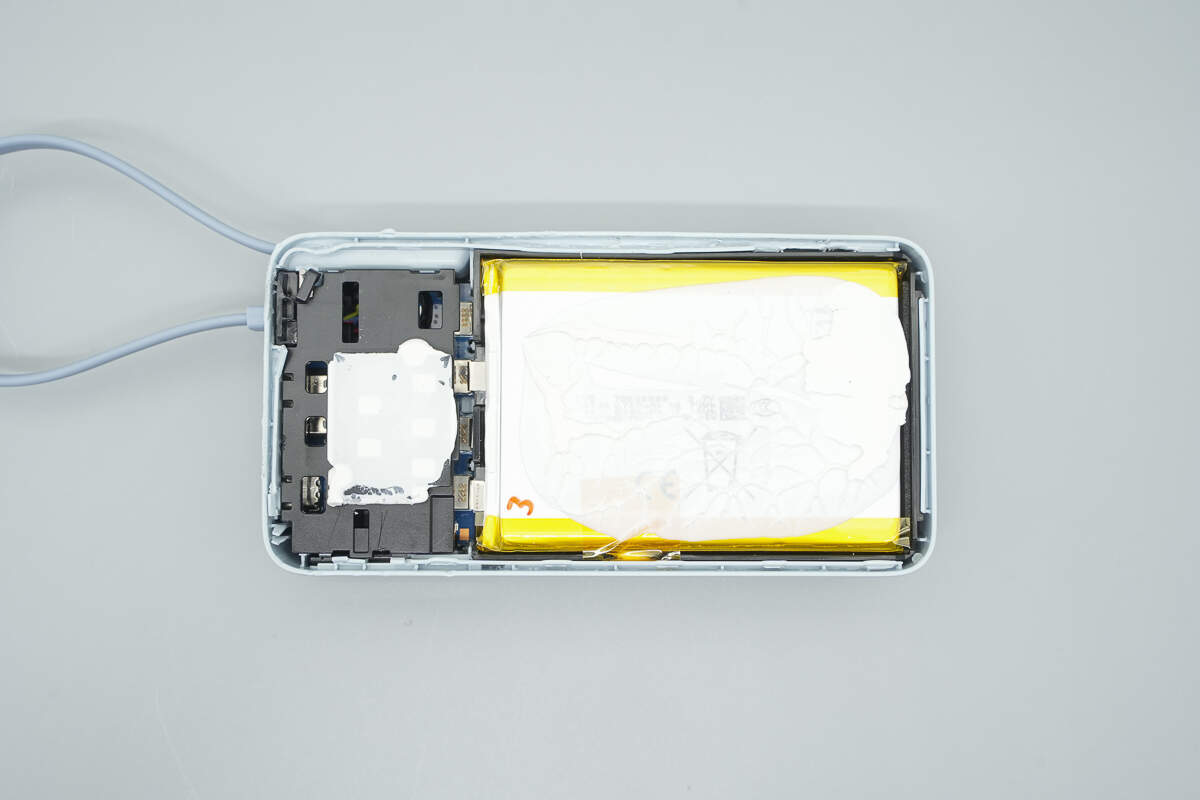
Remove the graphite sheets. The PCB is covered by a plastic plate. Both the battery cells and the plastic plate are secured with adhesive.
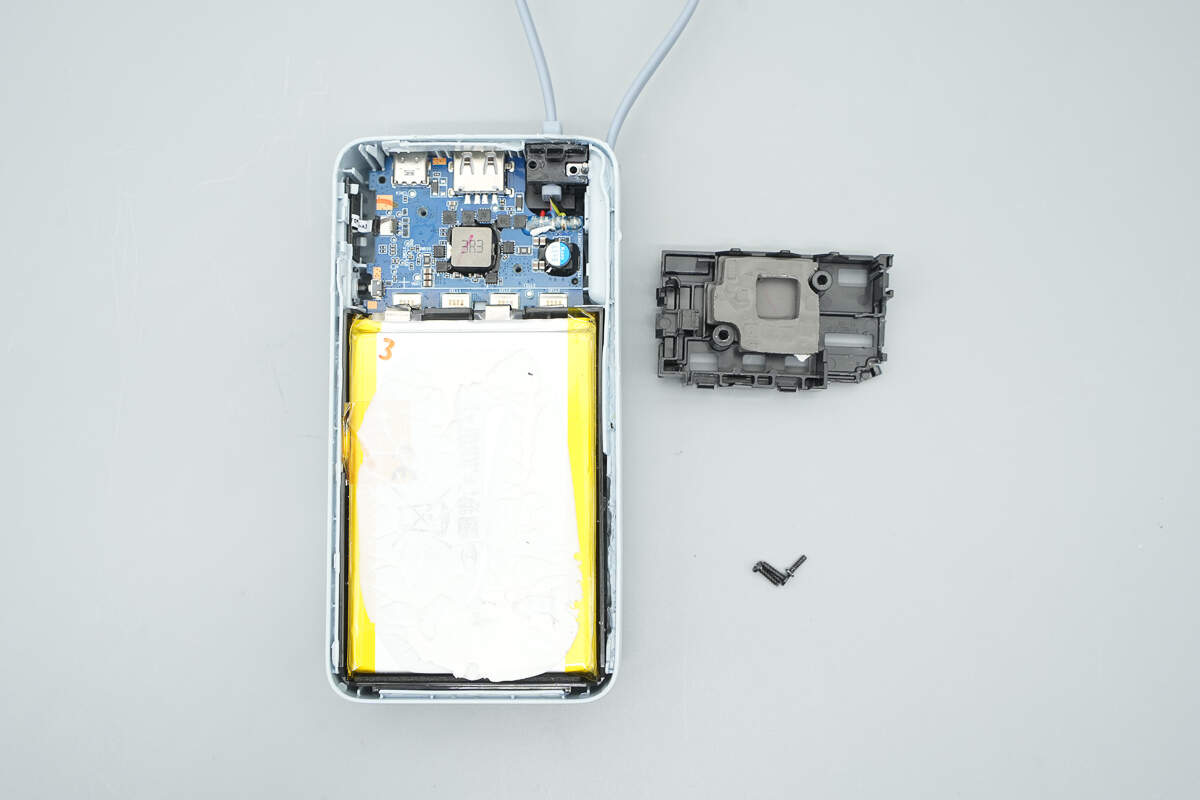
Removing the plastic plate, the inner side of the plate has a thermal pad aligned with the inductor area.
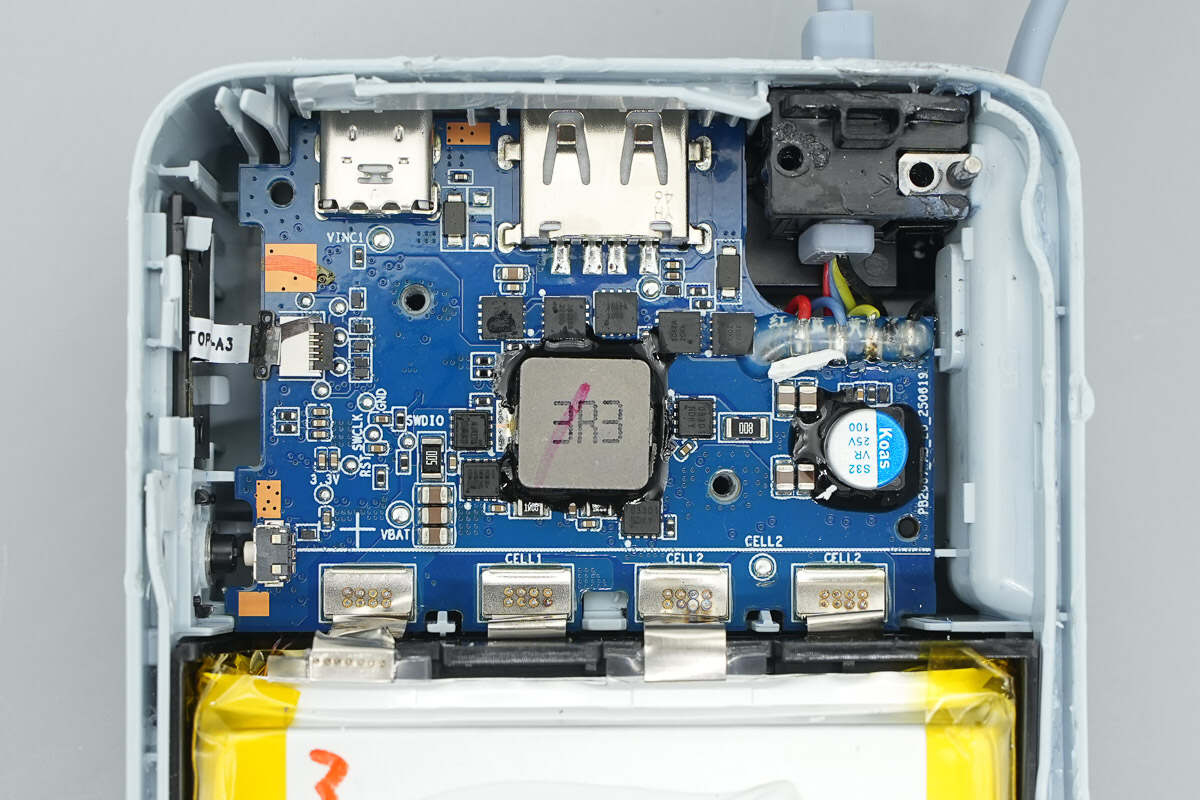
The battery cells are spot-welded to the PCB, and the digital display is connected via a ribbon cable.
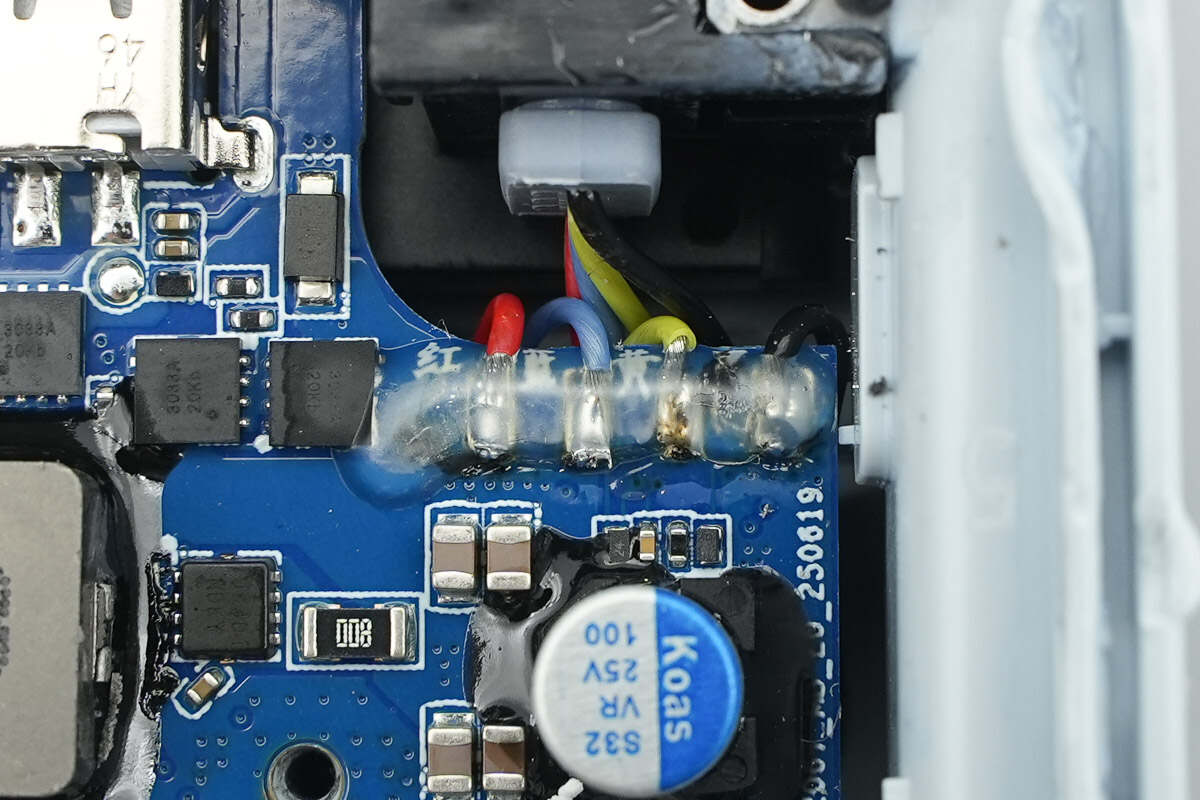
The solder joints of the USB-C cable cores are protected with adhesive.
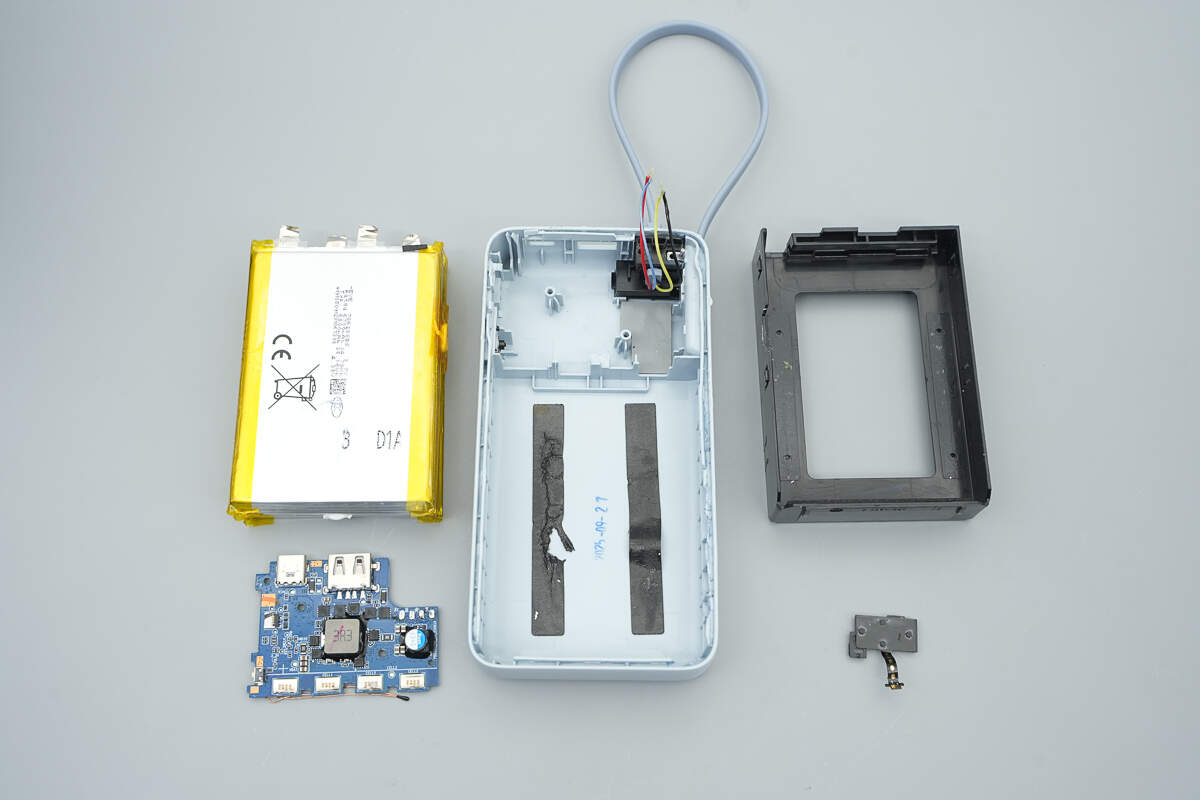
Remove and separate the battery cells and PCB. The cells are protected by a plastic frame.
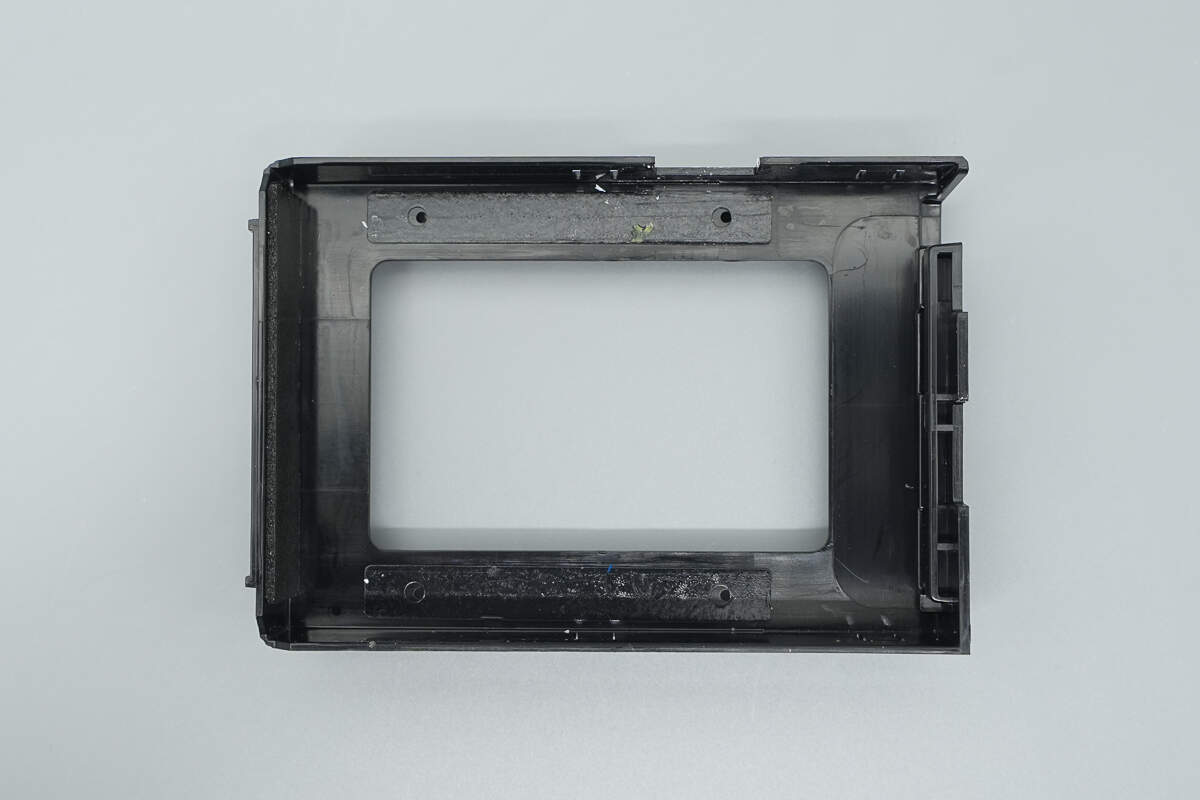
The inside of the plastic frame is lined with foam.
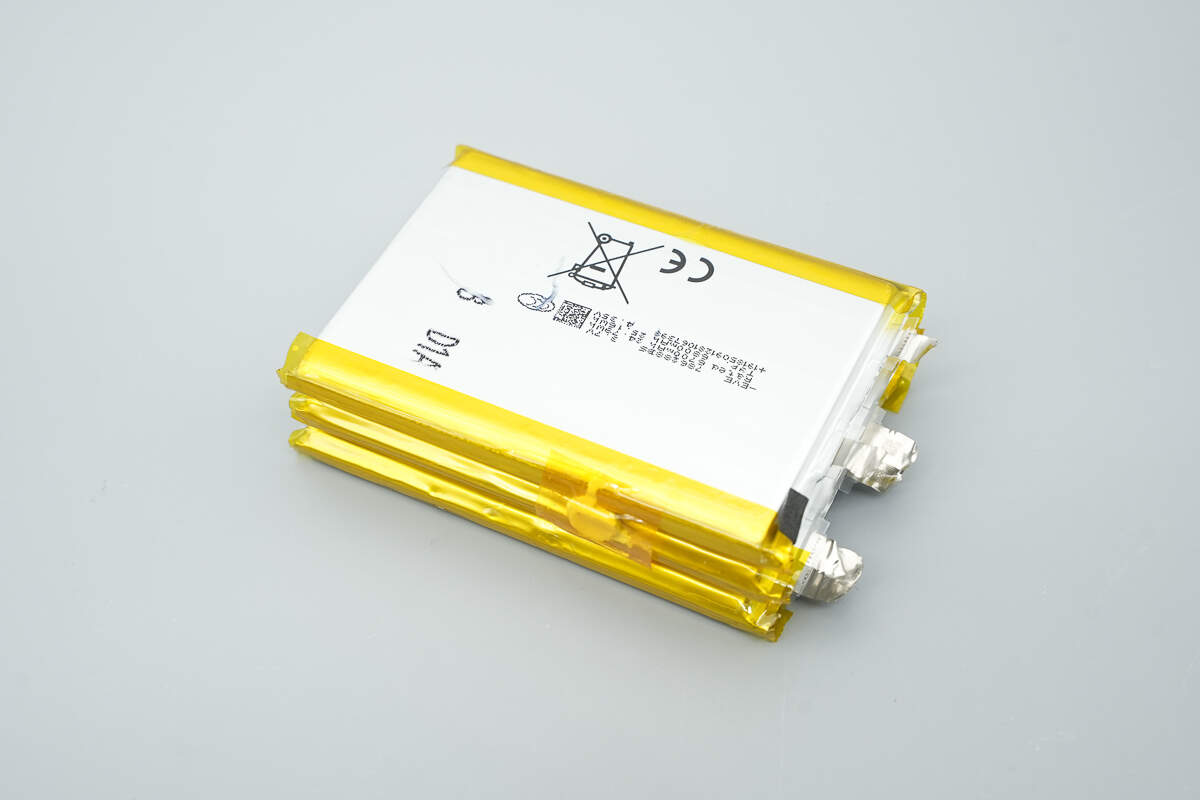
The battery pack consists of three polymer lithium-ion cells.
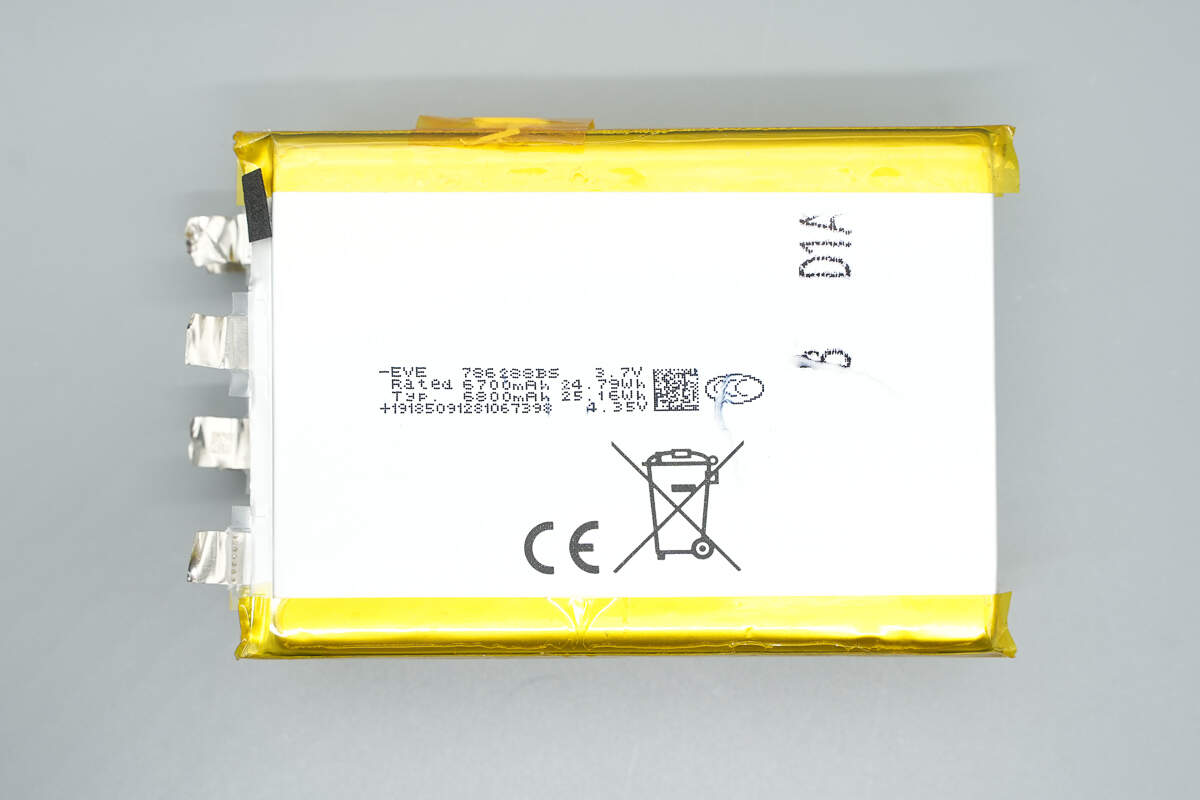
The three cells are from EVE, model 786588BS, with a rated voltage of 3.7V. Each cell has a rated capacity of 6700 mAh and rated energy of 24.79 Wh, with a typical capacity of 6800 mAh and typical energy of 25.16 Wh. The charging cutoff voltage is 4.35 V, and the cells are certified with both CCC and CE.
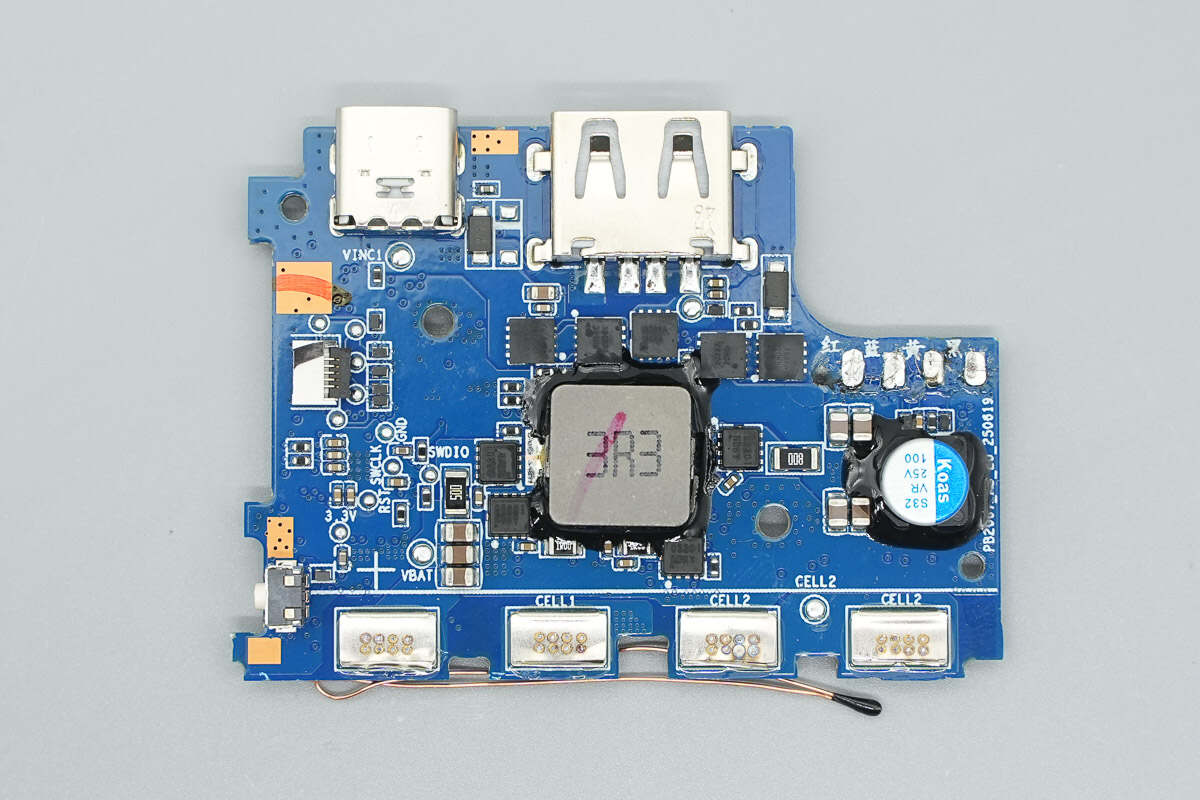
The front side of the PCB features synchronous buck-boost MOSFETs, a buck-boost inductor, VBUS MOSFETs, and a solid capacitor.
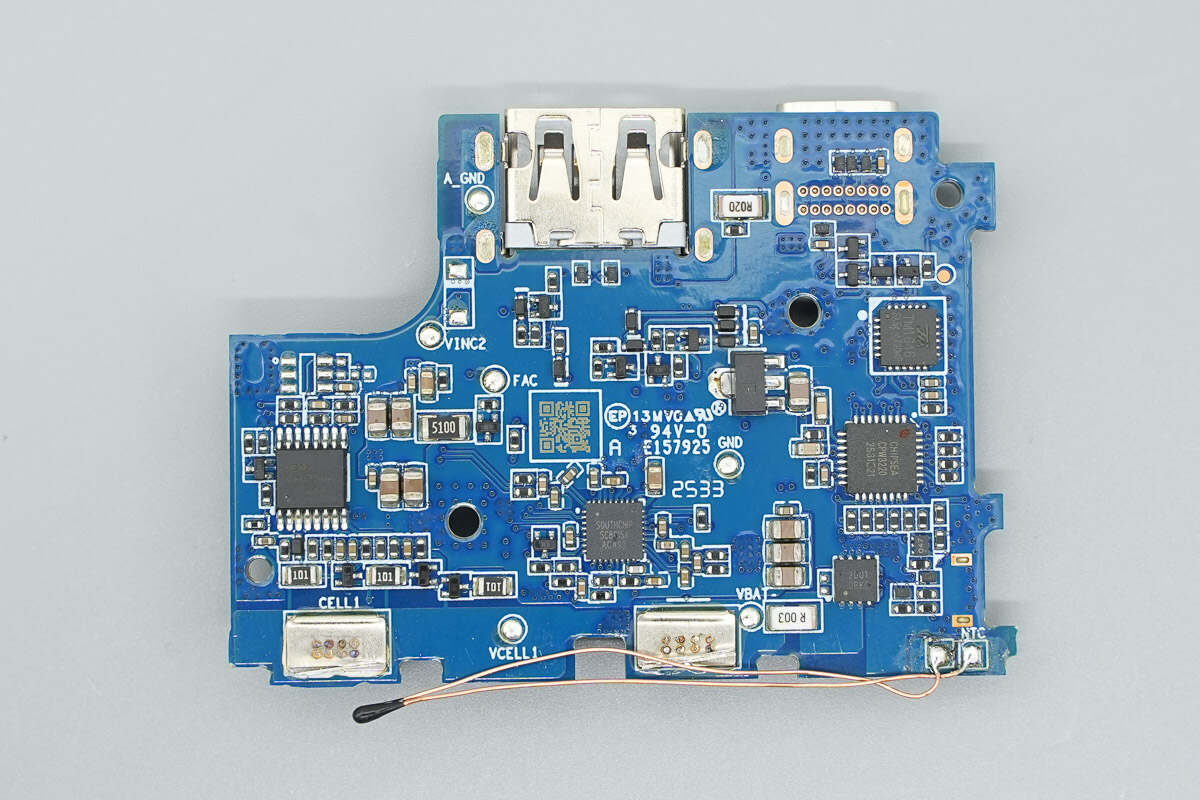
The back side houses the battery protection chip, battery protection MOSFETs, synchronous buck-boost controller, protocol chip, and MCU.
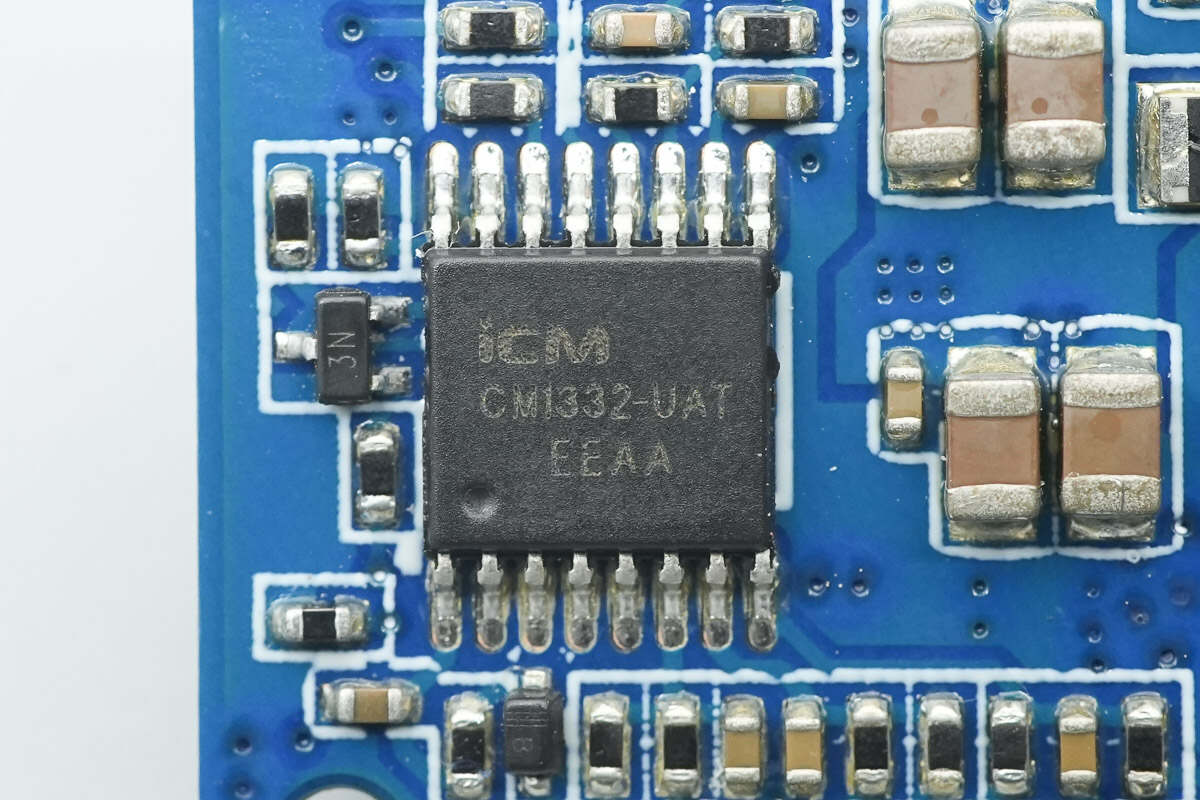
The battery protection chip is from iCM, model CM1332-UAT. It is a protection IC specifically designed for 3-series lithium, iron, or sodium batteries, featuring built-in high-precision voltage and current detection circuits. By monitoring the voltage of each cell, charge/discharge current, and temperature, it provides protection functions including overcharge, over-discharge, cell balancing, disconnection, discharge overcurrent, short circuit, charge overcurrent, and over-temperature. The discharge overcurrent protection delay is adjustable via an external capacitor, while the delays for all other protections are built in.
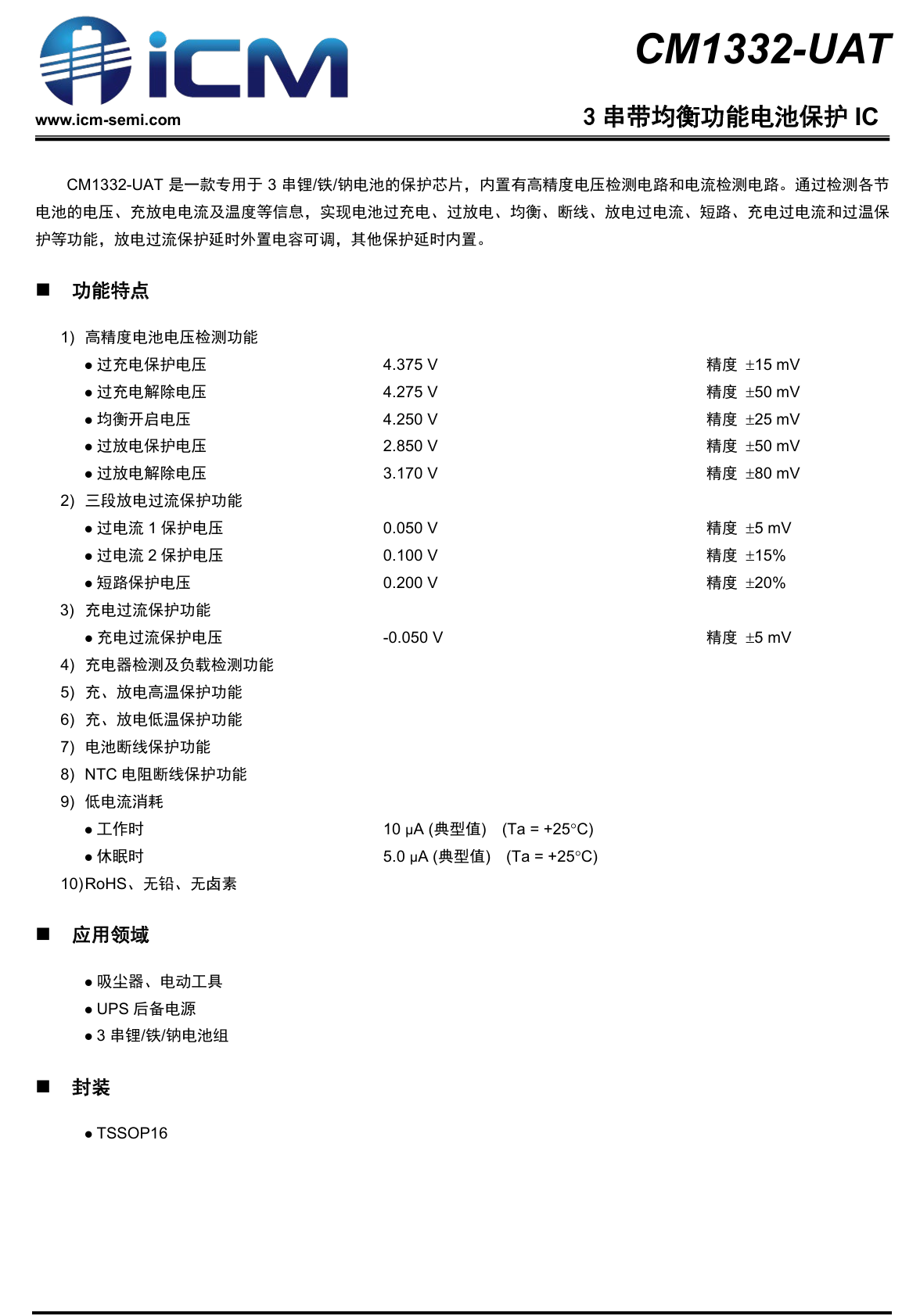
Here is the information about iCM CM1332-UAT.
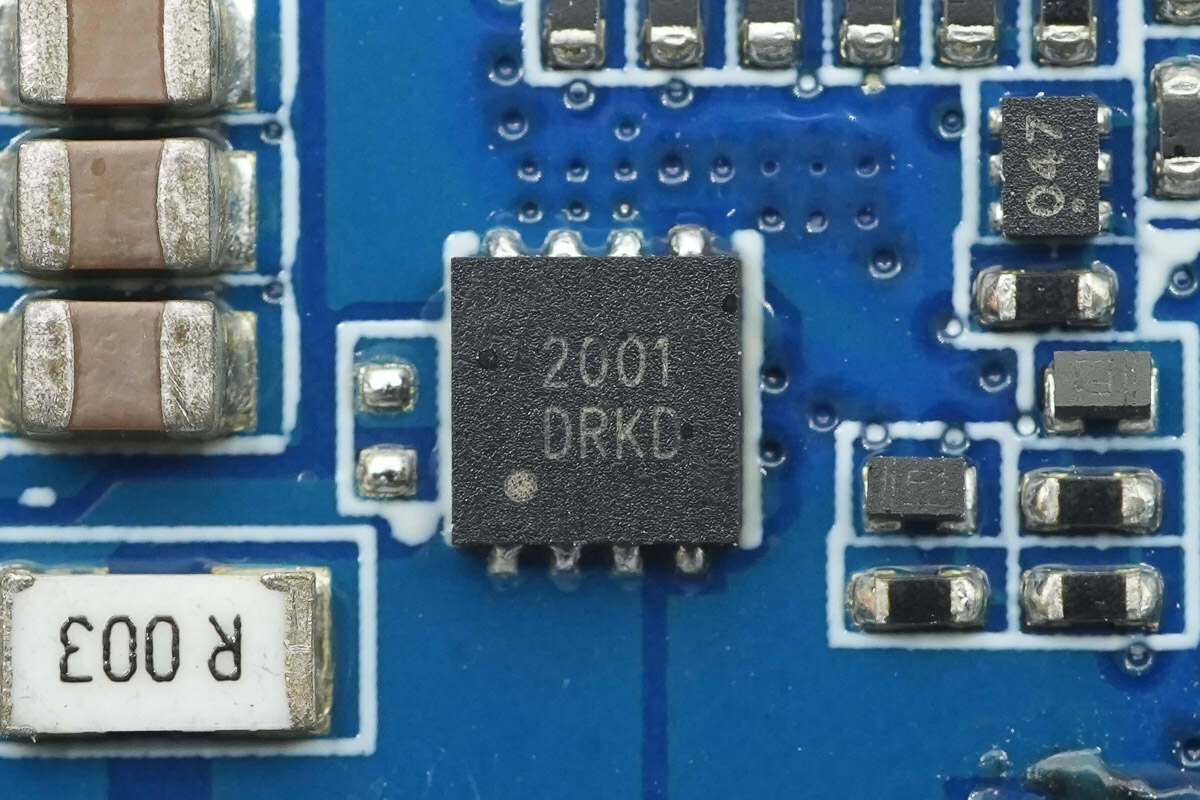
The battery protection MOSFET is marked with “2001.”
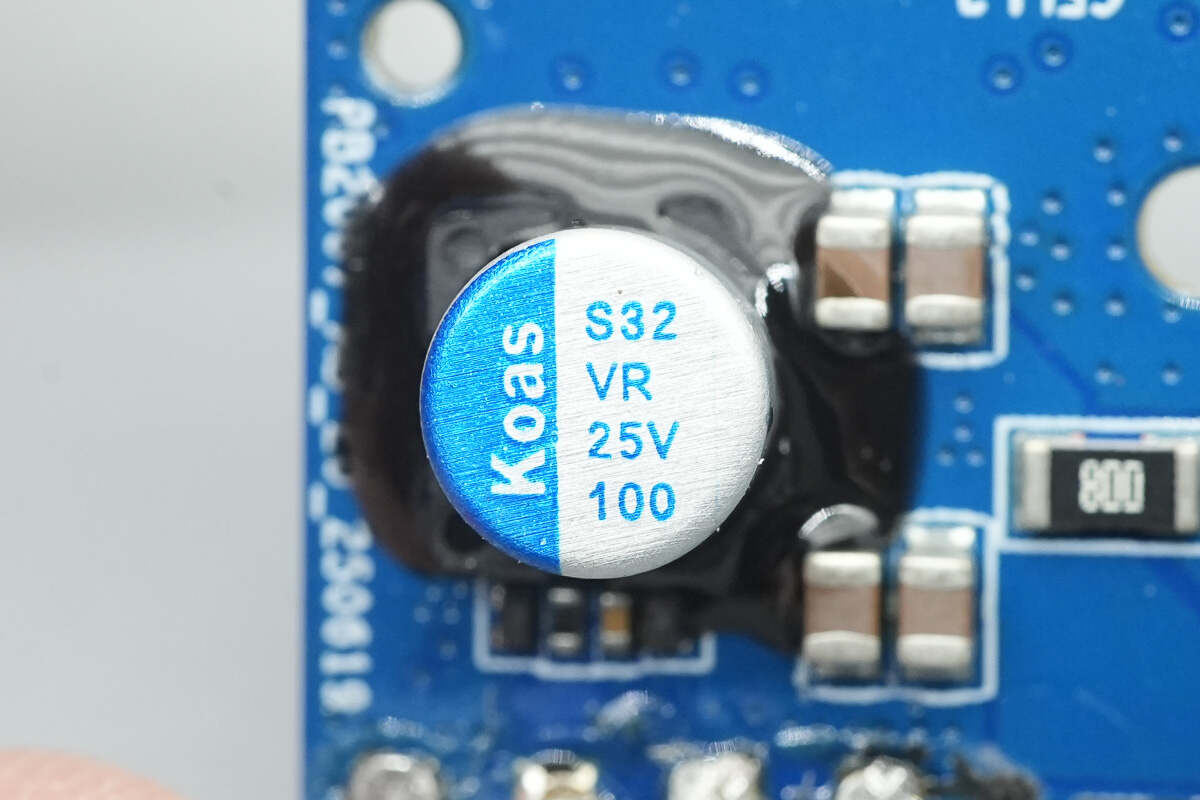
The solid capacitor is from Koshin, rated at 25V 100μF.

The synchronous buck-boost controller is from SouthChip, model SC8815A. It is a high-efficiency bidirectional controller supporting 1–6 series battery charging and a maximum operating voltage of 36V. It provides complete lithium battery charging management, with battery charge current and voltage, reverse discharge output voltage, and input/output current limits all configurable via the I²C bus.
The SC8815A integrates a 10-bit ADC, supports charge status indication, automatic adapter and load insertion detection, undervoltage protection, overvoltage protection, and overcurrent protection. It also features short-circuit protection and thermal shutdown. Packaged in QFN32, it is suitable for PD fast-charging power banks, USB-C hubs, and industrial power applications.
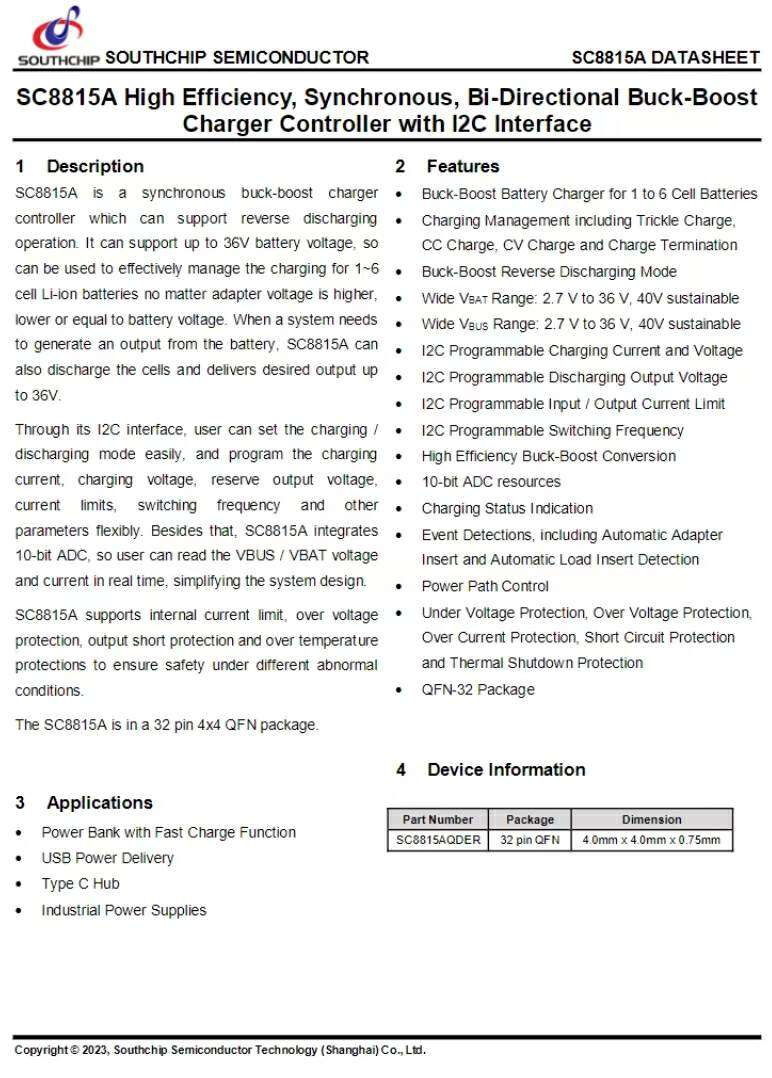
Here is the information about SouthChip SC8815A.
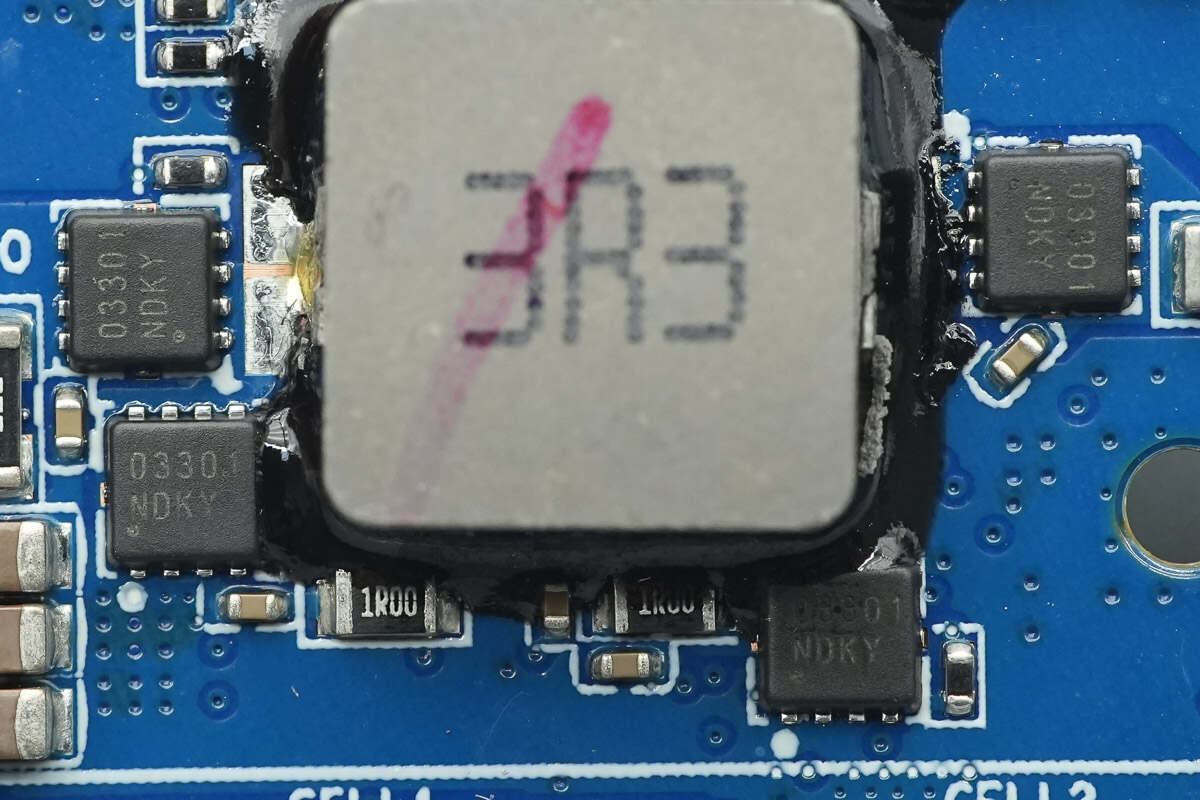
All four synchronous buck-boost MOSFETs share the same model.
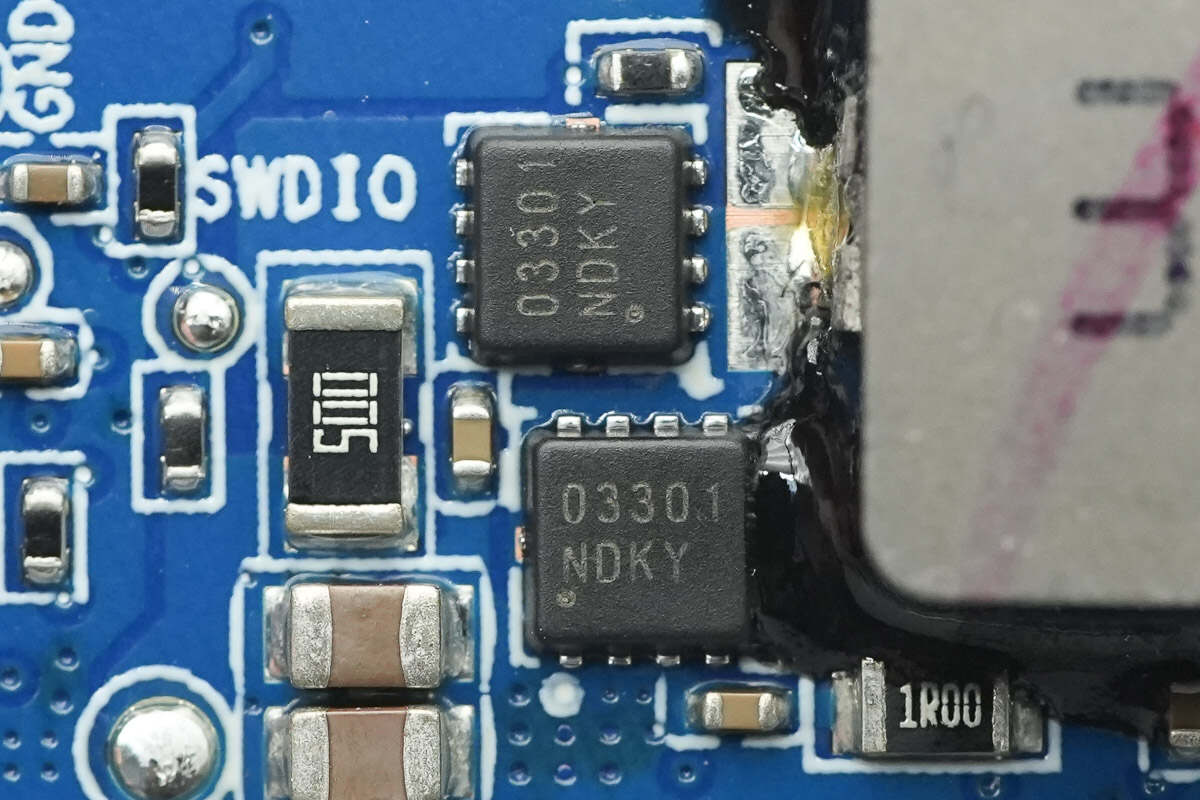
The synchronous buck-boost MOSFETs are from Willsemi, model WNM03301D. They are NMOS devices with a voltage rating of 30 V and an on-resistance of 4.3 mΩ, packaged in PDFN 3.3 × 3.3 mm, 8-lead format.
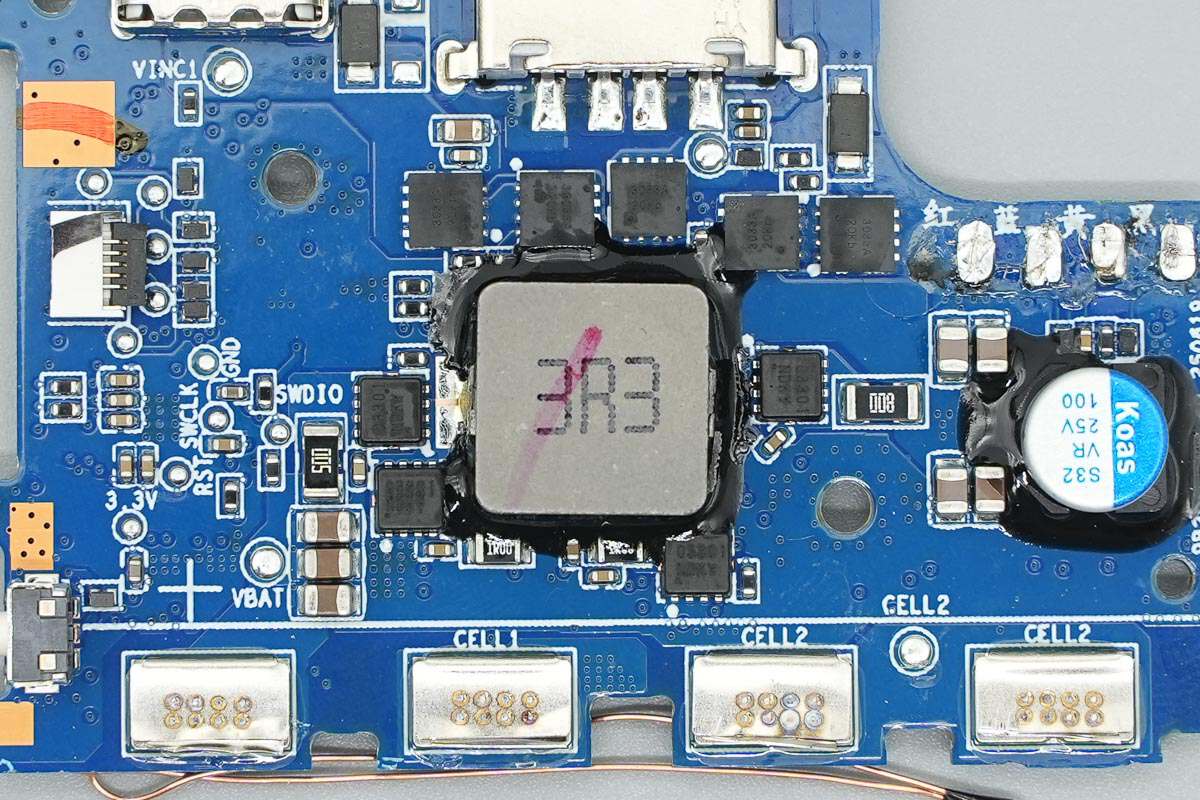
The buck-boost inductor is secured with adhesive.
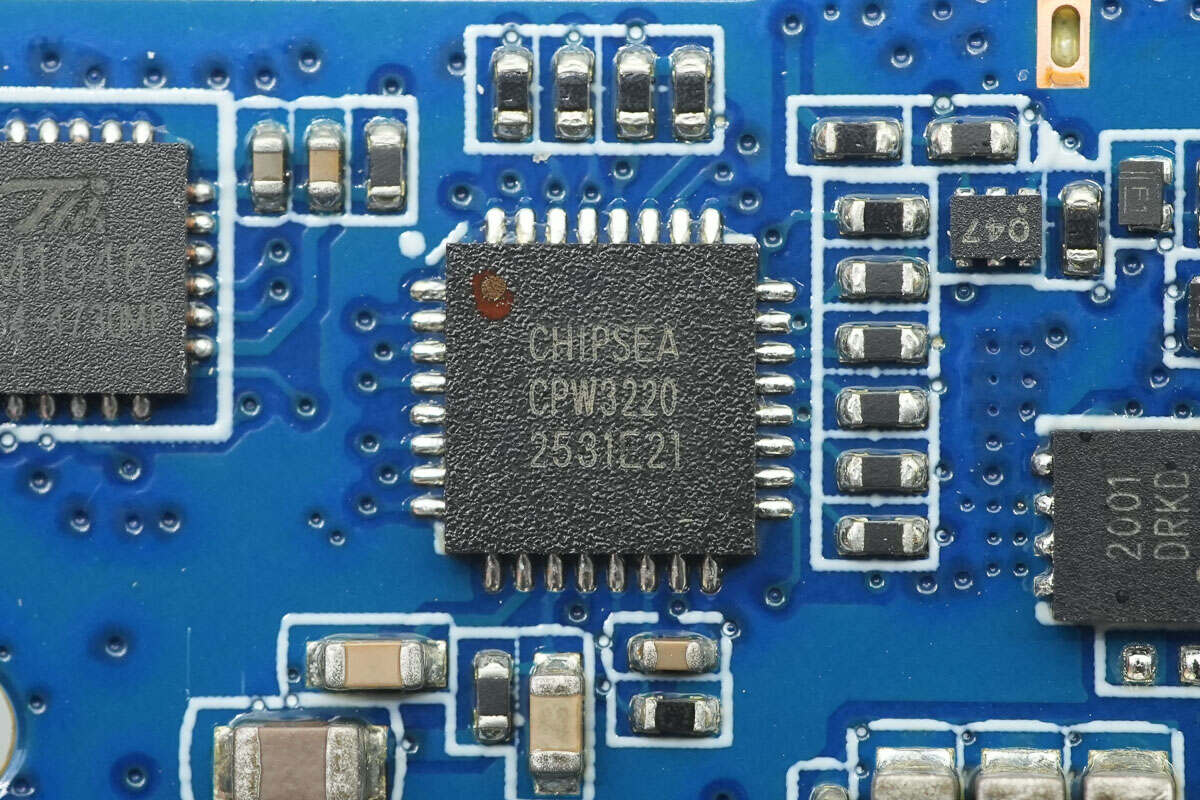
The Chipsea CPW3220 series is a USB Type-C and USB PD controller designed for bidirectional battery applications. It integrates two independent Type-C CC channels, USB PD functionality, a load switch driver, and USB BC1.2 support. Additionally, it incorporates multiple fast-charging protocols for various smartphones, enhancing charging compatibility with end devices. This makes it suitable for power banks, power tools, and other applications, enabling a dual Type-C port solution with a single chip.
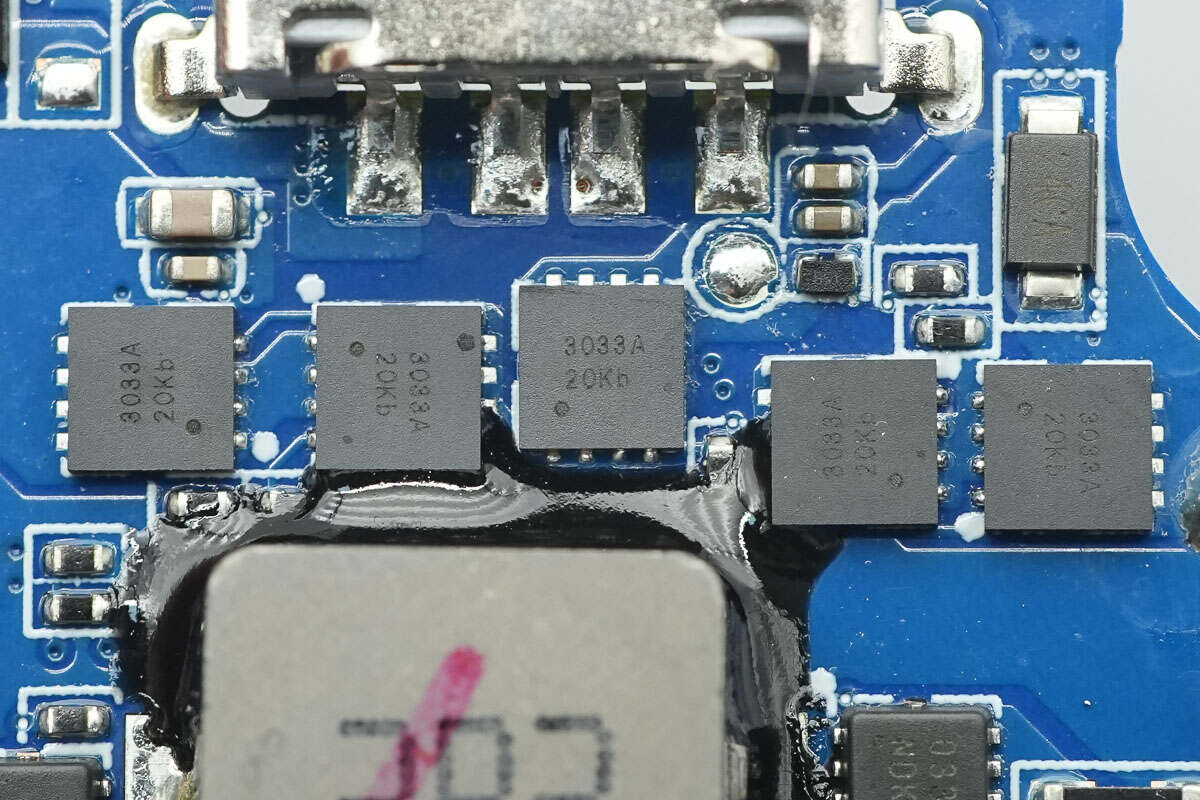
The five output VBUS MOSFETs for the built-in USB-C cable, USB-A port, and USB-C port are marked “3033A.”
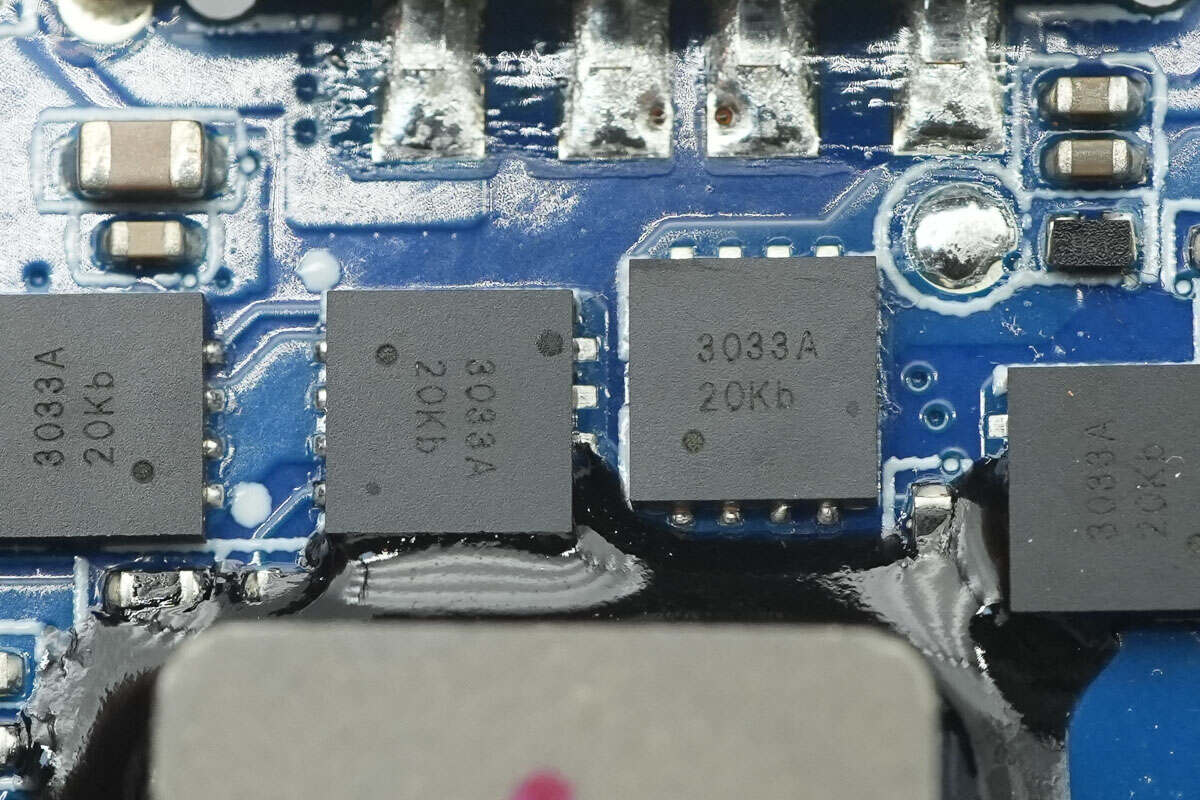
The MOSFETs marked “3033A” are model WPM3033A. They are PMOS devices with a voltage rating of –30 V and an on-resistance of 8 mΩ, packaged in DFN 3.3 × 3.3 mm, 8-lead format.
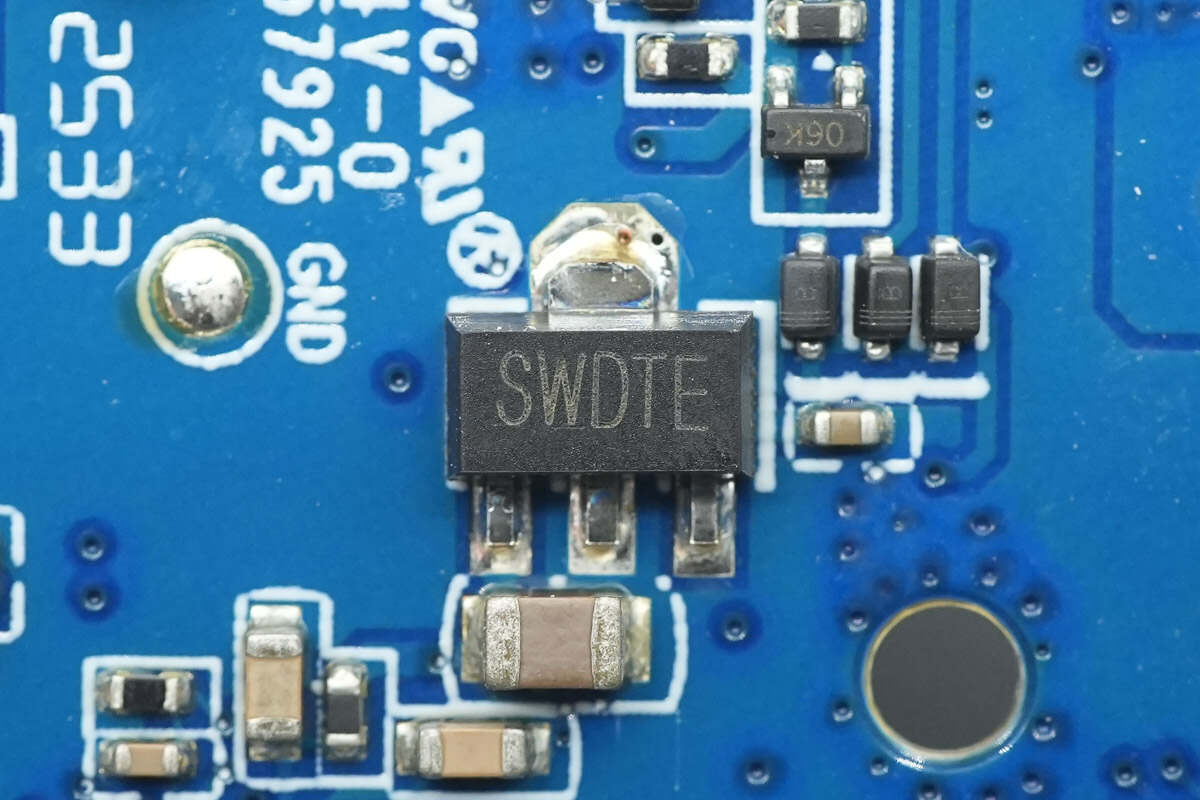
Close-up of the voltage regulator chip marked “SWDTE.”
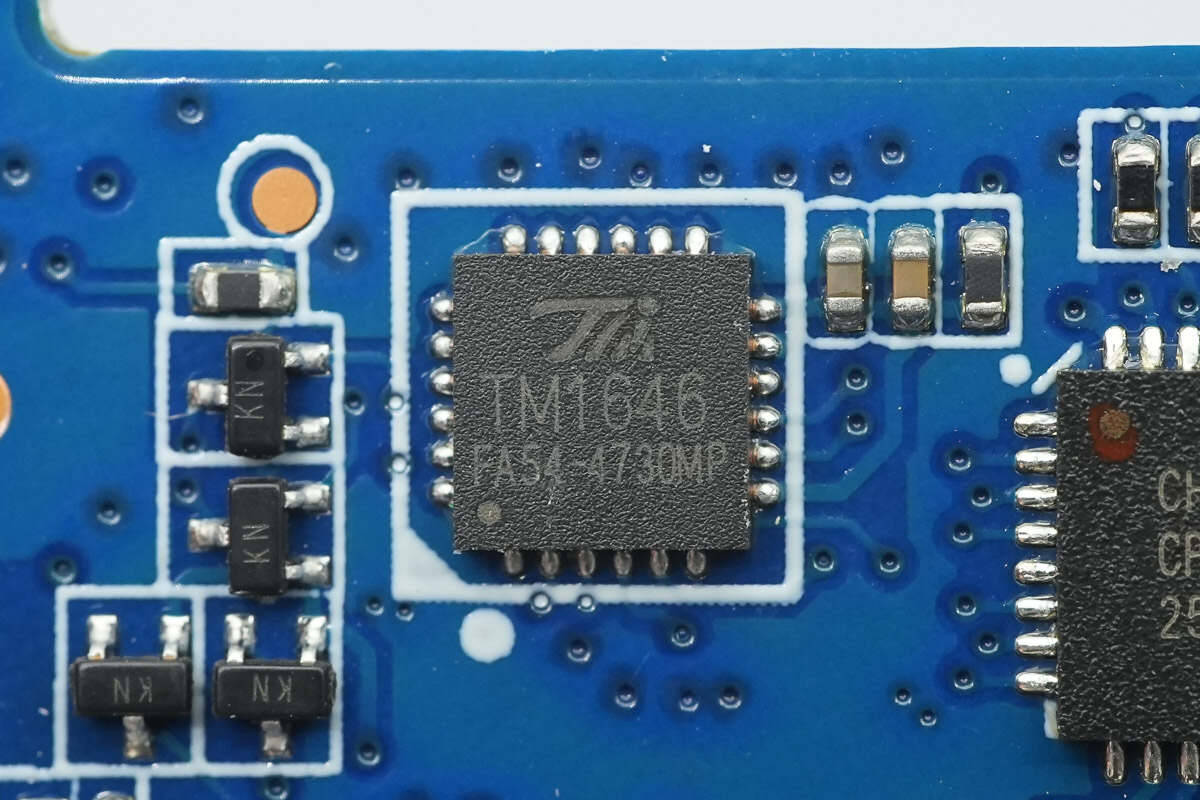
The TM1646 is used to drive the digital display.
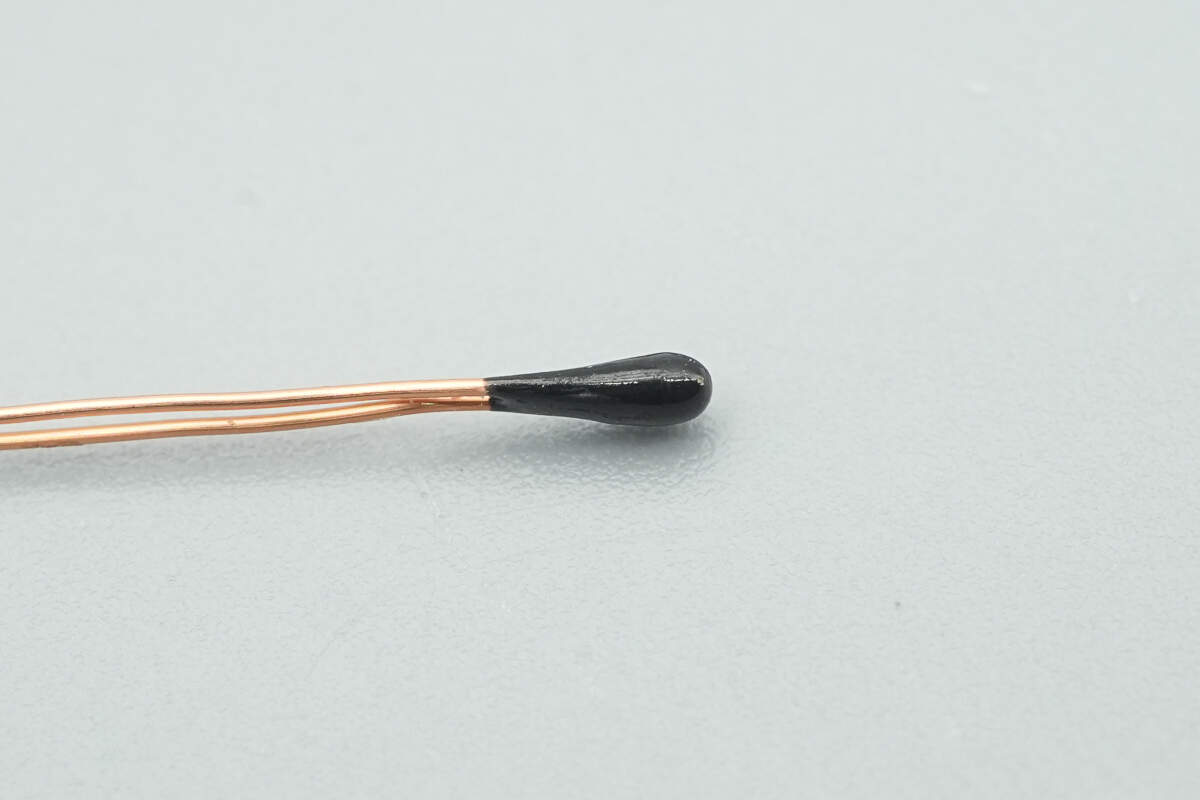
Close-up of the thermistor.
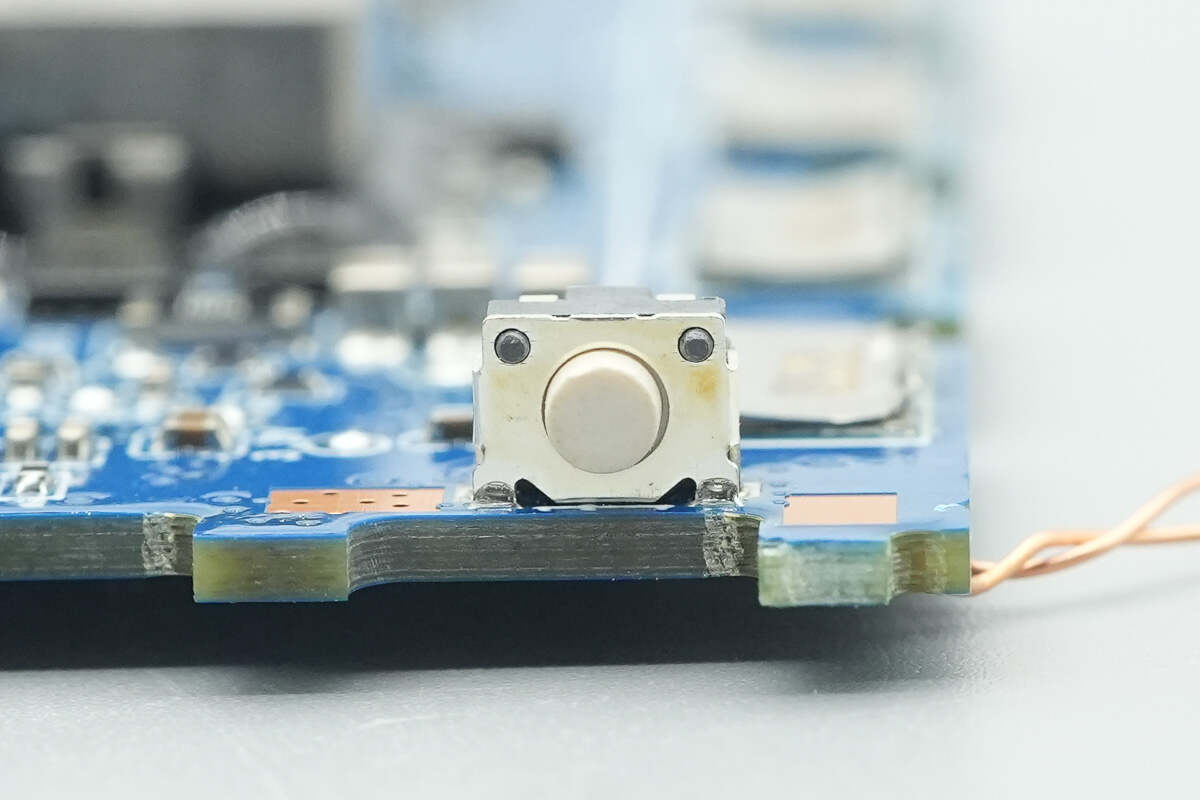
The power button is mounted using surface-mount soldering.
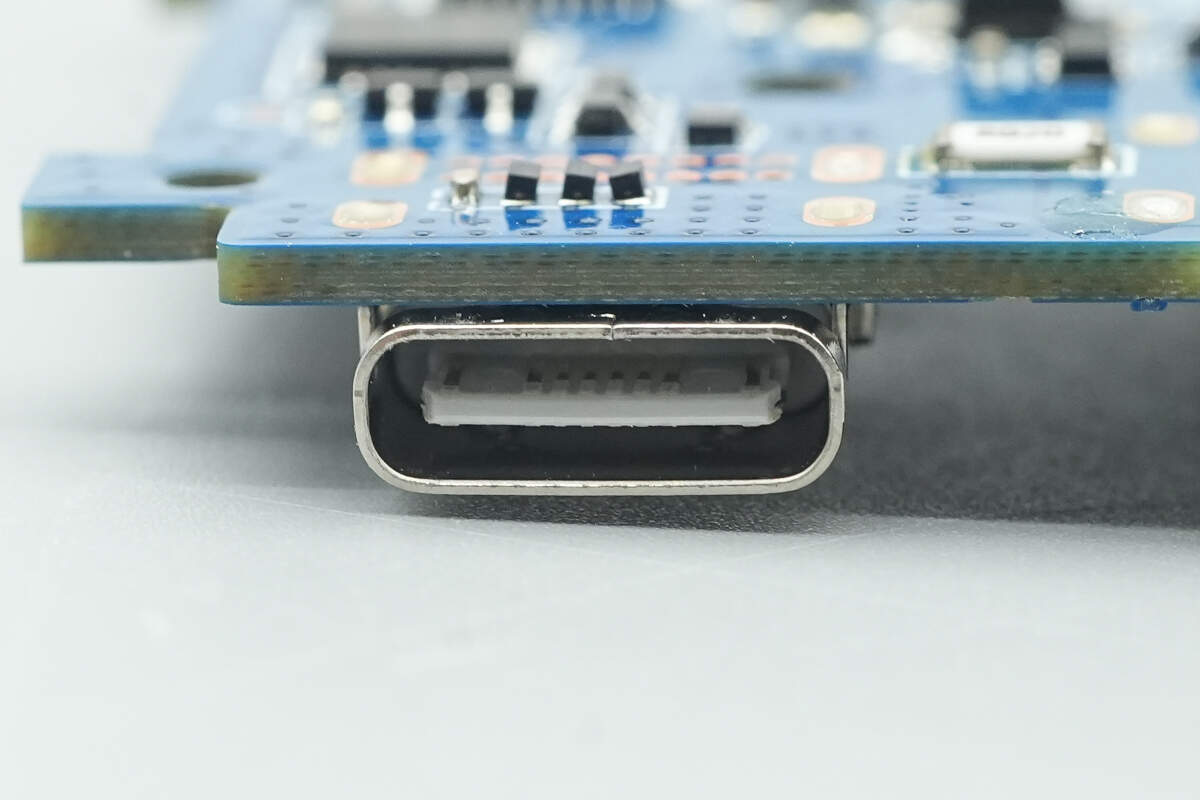
Close-up of the USB-C socket.
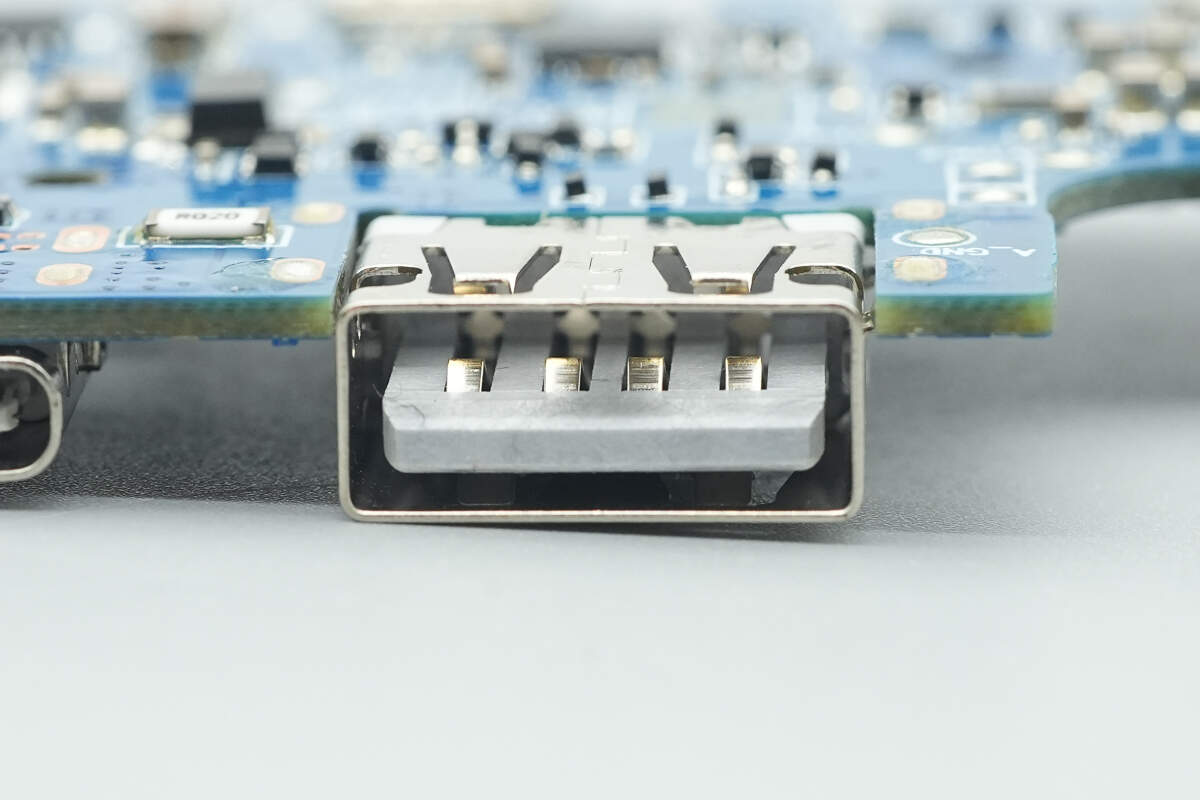
Close-up of the USB-A socket.

Close-up of digital display.
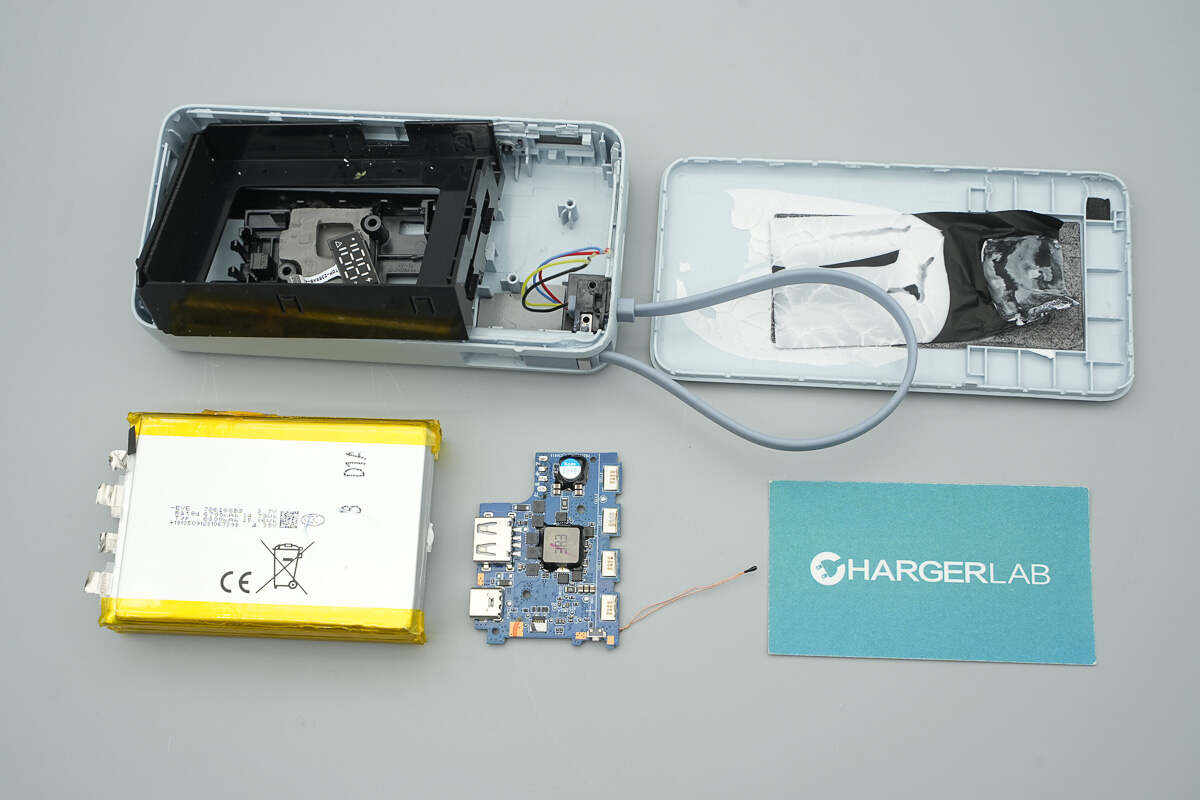
Well, those are all components of the Xiaomi 67W 20000mAh Power Bank with Integrated Cable.
Summary of ChargerLAB

Here is the component list of the Xiaomi 67W 20000mAh Power Bank with Integrated Cable for your convenience.
It features a minimalist design with an LED digital display that can show the remaining battery level. The built-in USB-C cable is 24 cm long and can also serve as a carrying strap. With a 20,000 mAh capacity and 67 W output power, it provides ample power and performance to meet users’ needs.
After taking it apart, we found that it contains three built-in EVE polymer lithium-ion cells, certified with CCC. It uses the iCM CM1332-UAT battery protection chip in conjunction with a thermistor. Fast-charging control across all ports is managed by a Chipsea CPW3220 MCU paired with a SouthChip SC8815A synchronous buck-boost controller. Both the battery cells and PCB feature reinforcement and thermal management measures, reflecting reliable craftsmanship.
Related Articles:
1. Teardown of HONOR 80W SuperCharge Wireless Charger Stand (Power-W06)
2. Teardown of Infypower 40kW EV SiC Power Module (REG1K0135A2)
3. Teardown of Delta 550W SiC Server Power Supply (DPS-550AB-2)

